#manga meta
Explore tagged Tumblr posts
Text
Jujutsu Kaisen Chapter 238: Shinjuku Showdown, Part 19
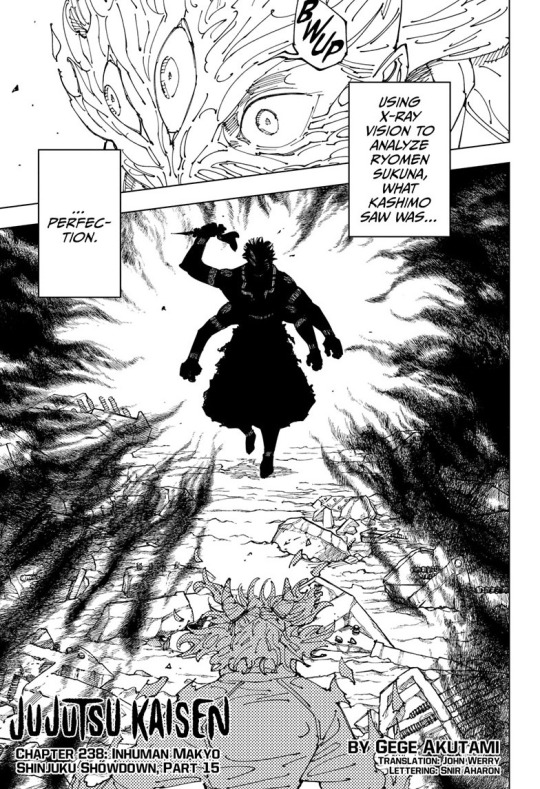
Oh boy oh boy. Another jjk chapter with Sukuna showing off why he is the KING of Curses. Beyond his strength, he speaks like a king to those he defeats, and his meaning is very esoteric.
I'm going to go full fanboy in this post, everyone, so please forgive me if you are here to hear bad things about jjk (you're weird, btw).
Perfection...Beautiful..
Kashimo looking at Sukuna with X-ray and seeing nothing but perfection is exactly what I feel looking at Gege.
But on a serious note.. Finally, seeing Sukuna's true form in action is insane!!! He looks so terrifying, and Kashimo knew that instantly. Sukuna not having any strain on his heart or lungs due to the build of his body is so damn impressive. I love seeing him flexing his perfection to Kashimo and then blitzes him.
I love this moment because it's showing how much Kashimo overestimated his ability to fight Sukuna. I knew Kashimo was a non factor, and Sukuna made it APPARENT. He literally showed Kashimo, he just was not that good, lol. (I was never a Kashimo fan, so this is nice for me).
Sukuna is quite truly beautiful. Gege gave him such a design to reflect him being the peak of jujutsu. I just want to say thank you to gege for following through so thoroughly on this.

Then to go even farther and give us Sukuna's feats against the great sorcerers of the past was even better. He defeated the Sun, Moon, and Stars squad that Uro was once a leader of. I love Gege doing this type of stuff, man!
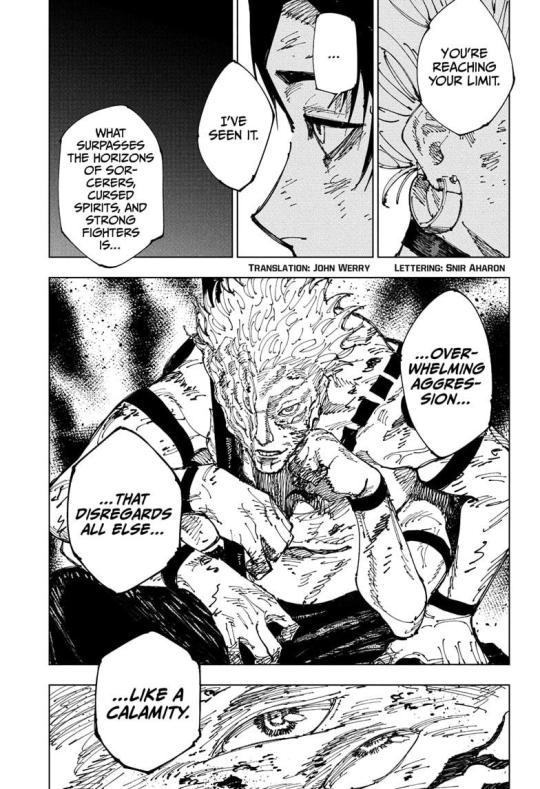
If you remember, Uro's vision of calamity when talking to Yuta was Sukuna, and when Sukuna revived she knew it was him just based off his cursed energy. Gege made sure that all of this was continued by giving us more lore on Sukuna's final form.
It's these little things that really move me in story telling. Connects those dots for us!
We Are Loved Because We Are Strong
Sukuna's speeches to people after defeating them is becoming one of my favorite things in jujutsu kaisen. I already loved his moment with Jogo + his final words to Gojo, but now we can add Kashimo to this list, lol.
I love Sukuna mentioning Yozoru's words to Kashimo, because it directly reflects the short conversation we saw between Kashimo and Kenjaku. Kashimo wanted to go against Sukuna to feel fulfilled. Initially, I took this as a warrior fighting for the fulfillment of a real fight, or a true fight to the death. Kashimo is similar Gojo, where he felt all the surrounding sorcerers were below him, causing him to separate himself as an entity. However, this was dissatisfying for Kashimo. The difference between him/Gojo and Sukuna, is that the king of curses accepted that as a fact of life. Due to this fact, he saw the world as his playground, and anything that went against his desires were to be destroyed.
“You know the answer you seek, you just can't comprehend it, right..?”
I love this quote by sukuna. Implying that kashimo knew all along the answer to his soul's dilemma.
“Is strength solitude”?
That question is always known by the strong, but I think sukuna's lesson was to deeper understand how to live as the strong.
“You were strong”
I see this as sukuna reminding kashimo that because of his strength, love should be known. Those under you will love you because you are strong. He goes on to tell kashimo that the ones who challenged him did not do so to curse him, but to be recognized and to validate themselves. That itself is love, or maybe an easier word to translate it would be “admiration”.
Admiration however is a product of love. That is how sukuna connects with those below him. I believe Uraume is the example of this, as he/she has been by sukuna's side for seemingly the longest. That love Uraume has is most likely the best execution of love sukuna can have for one below him.
(it makes me wonder why uraume is so special)
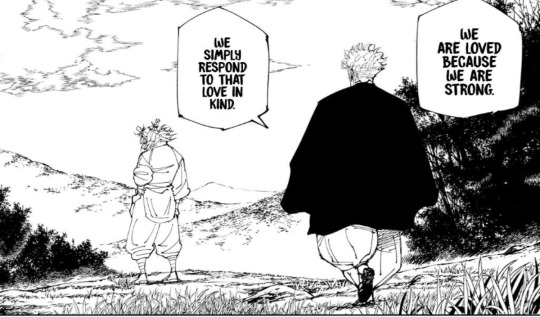
Telling kashimo that he was strong, but also lamenting is greedy. Wow, sukuna... when you think about it, sukuna's outlook is very royal and fits that of a being existing on a higher frequency. What Sukuna is trying to relay, is that being the strongest comes with natural love (or being strong in general). It is when you begin to hate that strength or see it as a burden that you begin to lose sight of that love. Those around you love you for your strength, even those that challenge it have some form of admiration and search for recognition from that strength.
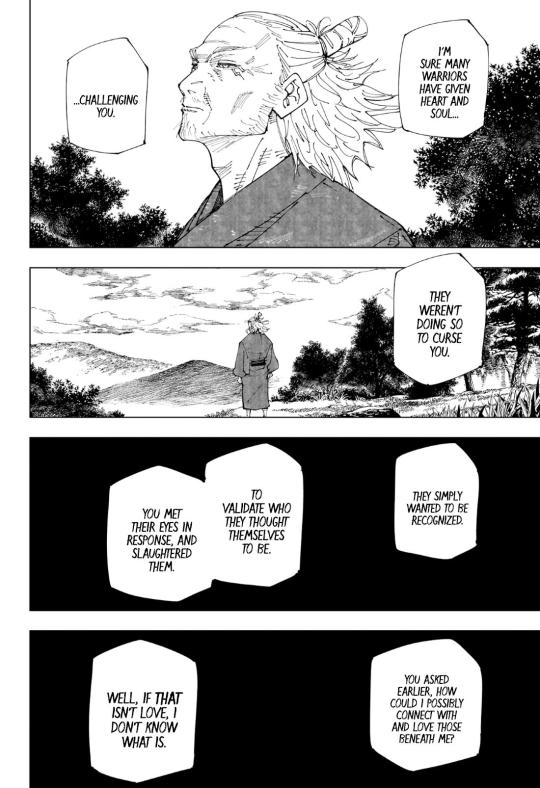
This takes me to when Nanami said to Gojo that he also once believed they should just send him out on every mission. Gojo felt that he could never be understood, and that burden carried with him his entire adult life. Before, he had Geto who he saw as his equal, best friend and dare I say other half. That is why he wished that Geto was there, patting him on his back. Gojo felt separated from everyone, even if he loved them, he still felt isolated. I believe that Geto was Gojo's “love” and that is why he could never truly feel satisfaction.. He could never save Geto.
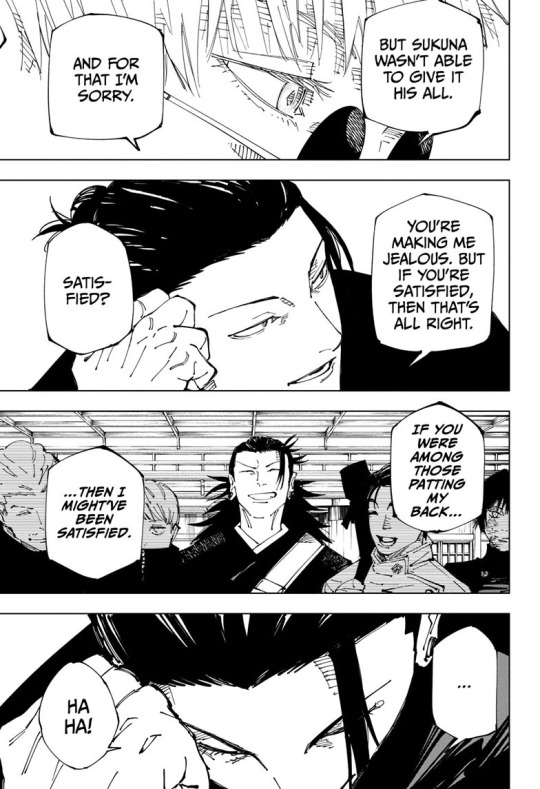
(Sorry to go back to the sadness that is Gojo's separation from others as a human due to his exceptional skills as a sorcerer, but all of this ties in together so well).
Kashimo and Gojo both got “greedy”. They were strong, but also wanted to hate that strength instead of taking everything that came with it and finding true satisfaction within. Gojo felt pure isolation from his talent, while Kashimo felt lament because he could never have an equal. Both of these stemming from feeling the need for others to fulfill them, which is why Sukuna believes that...
Love is Useless...
Sukuna calls love useless. I find this so intriguing, because the “love” he spoke of was surrounded by the motif of “the strong”, and also he straight up says the thought of needing someone else to fulfill him never crossed his mind. He never thought that another person would give him the satisfaction he wanted, instead he put his desires first.
“I live according to my own stature. If that can't be measured or understood, that's not my problem”.

MEGUMI? YOU HEAR THAT?!
My god i hope megumi is listening. I talk with @theanimepsychologist about megumi coming back and also how sukuna is possibly his golden shadow. To expound on this train of thought, I see all of this as Gege playing deeper into Sukuna's role as megumi's catalyst.
In simpler terms, I see Sukuna & Megumi's dynamic on the same level as Mahito & Yuji's. Mahito propelled Yuji's understanding of being a jujutsu sorcerer, while Yuji propelled Mahito as a curse. For Sukuna and Megumi, Sukuna saw Megumi's technique as something to gain. There could possibly be more he plans on doing with the ten shadows specifically, giving him an even more powerful arsenal than he had before.
For Megumi, Sukuna was the first to make him see himself as a stronger person. The words “why did you run away” stuck in megumi's mind from the first fearsome womb chapters. That was when he discovered he could place things in his shadow, and from there he began to elevate each arc.
Sukuna being in Megumi's body right now feels like a terrible journey of enlightenment for megumi. I find it interesting that sukuna states he was born cursed and unwanted. Megumi talks as if he was treated the same way, even believing his father is still alive living it up somewhere. Megumi has no idea he faced his father in shibuya, or that his dad wanted him to be something outside the zenin clan. Even if he did end up there, he believed megumi would be okay because he was talented. Megumi never saw himself as wanted by his family, and his cope for that was Tsumiki.
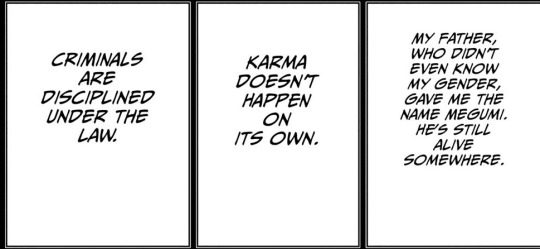
Sukuna was different, he chased after his desires alone. He believed he could make himself happy, and that there was no one else who could fulfill that. Megumi losing Tsumiki is so difficult for him because he relied on Tsumiki as his heart and conscious. At first, megumi was indifferent, but expressed himself boldly. Tsumiki's positive outlook is what moved megumi, and that was all the family he had. Megumi isn't heartless as sukuna may naturally be, but his decision to save people has left him too selfless.
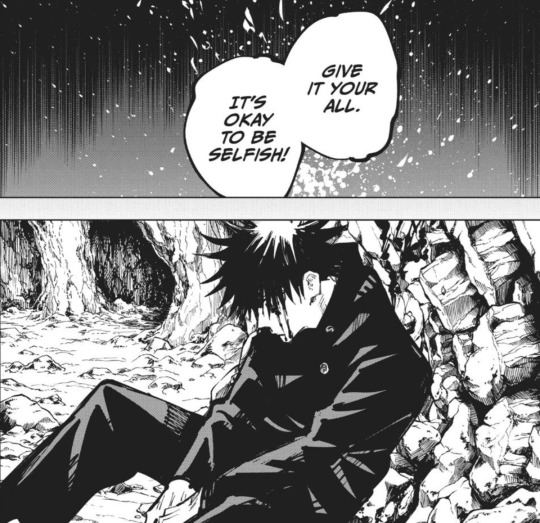
For megumi to return, I need to see his understanding of self-worth change. He needs to see his strength and importance as an individual to truly understand the love that comes from being strong. In order to save people, you need strength, but you cannot develop that strength without having a stronger sense of self to dismantle any sparks that fly your way.
"Its okay to be selfish"
"A jujutsu sorcerer's growth never comes easy"
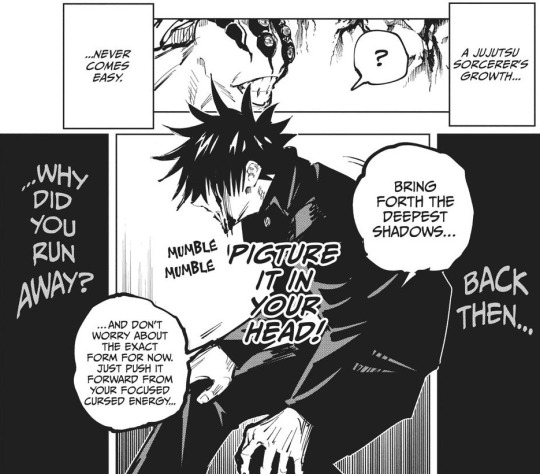
(I could continue on about this megumi and sukuna connection but i think my point is made)
That is why Sukuna said love is useless. There is no need to look to another to satisfy yourself. To understand yourself is to understand your desires. And to be true to one's self is to chase after those desires without remorse. He hasn't changed a beat from when he spoke to Jogo, and I love consistency.
What Can You Do...Brat?
The final spread of the chapter was C R A Z Y! Uraume and Hakari break out of the domain with no damage on either person, while Higaruma and Yuij (with scales and claws??) begin to drop.
WTH?
My assumption is that they are going to try to get Sukuna into Higaruma's domain to win a trial and take away Sukuna's CT. This could work, but I'm worried that even without a CT, sukuna is still going to be very proficient in his raw CE usage unlike the other sorcerers Higaruma has faced. Maybe that is all they need to start the process to save megumi, or something else entirely crazy that only gege can come up with!
Truly endless possibilities.
Gege is continuing to Gege (whatever that means) and I will continue to not miss a beat. I believe we have a break coming up, so we will have to digest on this chapter a bit before we figure out what's going on!
#jjk 238#jujutsu kaisen chapter 238#jjk meta#jujutsu kaisen meta#jujutsu kaisen manga#jjk 238 meta#gege akutami#weekly shonen jump#dh🍵#jujutsu kaisen#manga#manga meta
82 notes
·
View notes
Text
I am not at all qualified to make this post so obviously I will be making it. Basically I've noticed something with how men vs women and queer ppl consume shonen manga.
When I'm on tumblr and ao3 I mostly see women and queer ppl post about manga but on tiktok I see mostly (straight) men. And I see a lot of difference between what they usually want for characters (especially strong ones)
I'm gonna focus on jujutsu kaisen cuz it was this manga that made it finally click in my head. What ppl want for characters and the story is usually directly tied to their identity especially gender identity and ofc the patriarchy.
I'll start with the example that gave me this lightbulb moment: on twitter and tumblr (where I curate my feed btw which makes a huge difference since i follow mainly non-men) I see ppl wanting gojo to essentially have an emotional breakdown or go thru some type of pain and go berserk out of the emotional heartbreaking pain of losing his loved ones or being forced to kill them.
Then on tiktok (where I look thru my fyp so I don't really curate my feed so any manga type videos come up and they're mixed with videos of men) I see alot about who would win in a fight between sukuna and gojo. About who would "dog walk" the other. A LOT about fighting and violence and killing. (In my head I'm thinking why the solution is always straight to killing the other person? Idk writers can get creative with endings that don't contain just straight up killing characters)
This got me thinking: why are ppl so obsessed with the fight and the violence? Then I'm like: well it's a shonen that's the genre. But then that would mean almost everyone who consumes shonen would have similar thoughts. But like I pointed out in the example, that's not the case. Why do the men focus so much on the violence and the women and queers focus on the drama and emotion? The character and their relationships?
Then it hit me: it's about PROJECTION. About living vicariously thru these characters. Men project themselves on these powerful characters and live out their fantasies of being strong, powerful, violent with no one who can get in their way or beat them. It's why they get so offended when ppl bring up other characters that can or can't beat the character they have projected onto.
Women and queer ppl focus on the emotion because we project ourselves and live our fantasies: to essentially breakdown (think female rage?) Essentially in our lives we are often the ones who do the emotional heavy lifting. Ones who are taught to keep quiet or be the bigger person or look the other way. Our emotions are used against us. But when we project ourselves to characters like gojo who has a ton on his shoulders, who has to do everything, we want him to breakdown and cry and rage cuz WE can't do that. It's our way of releasing our need to breakdown and rage, by living vicariously thru him. Often times after this breakdown we want another character to comfort them. For them to be the one to take care of things for once so our character (us) can take a break.
And I notice we project onto male characters and I think there's 3 reasons for this. Male characters are usually better written cuz they are at the focus of shonen so there's more of them we can attach ourselves to. 2nd reason is cuz they're male and it feels like they're "allowed" to emote without having backlash (tho that's not really the case usually. Like if gojo had a breakdown he wouldn't have been seen as weak or ridiculed but if someone else, usually a girl or a male written more softly like modoriya from mha, they would be ridiculed cuz thats "weak". All this would me coming from the men in the fandom too cuz they can't project onto a "weak" character) 3rd reason is cuz we can take a character that men would make into this "alpha man strong" and turn him human. Have him be realistic and have emotions, something we rarely see in real life cuz u know the patriarchy and men can't be emotional unless it's anger etc.
But anyways so that's what I have noticed and being a woman in fandom is a different experience. Usually a good one cuz fandom was created by women and we are the biggest fan content creators when it comes to Fanfic and fanart. Even some of the best analysis I've seen come from non-men. And I'm often on platforms where majority are women and queer and I curate my experience so when I get to places like tiktok or YouTube comments it's like my little bubble popping and I'm reminded of the different ppl in fandom. There are men on our sides of fandom with thinning more aligned to what I have described as what women usually think! But for this post I'm talking majority.
Anyways idk if this made sense but I wanna know what others think, I'm very interested and curious about this topic
#jujutsu kaisen#jjk#gojo satoru#manga#manga fandom#fandom#manga meta#fandom analysis#women vs men#patriarchy#fandom meta#analysis#tumblr#tiktok#men in fandom#women in fandom#long post#long reads
15 notes
·
View notes
Text
I love how Yor and Anya's pajamas are like real pajamas from the 60s




In general, when they wear real clothes from those years >>>



#spy x family#twilight#loid forger#agent twilight#spy x family manga#yor forger#sxf manga#sxf meta#spy x family anime#sxf anime#anya forger
3K notes
·
View notes
Text
Gojo Satoru visiting Kugisaki nobara while she is in coma, sitting next to her, and talking to her. Gojo Satoru swapping souls with Yuta okkotsu, teaching him everything he knows about his cursed technique. Gojo Satoru hiding Sukuna's last finger to indefinitely postpone Yuji's execution. Gojo Satoru who bore the burden of being a monster, killed all the higher ups alone because he refused to let his students watch such gruesome sights. Gojo Satoru who believed he would win right til the end. Gojo Satoru who died knowing his students had got it from there, that they would be able to save Fushiguro Megumi. Gojo Satoru who let his body be used as puppet after his death. Gojo Satoru who died knowing all his students would be saved.
#satoru gojo#my love my heart my blue eyed princess#jujutsu kaisen#jjk#gojo satoru#best teacher gojo satoru#gojo satoru meta#jjk meta#jjk manga#jjk 266#jjk 267#jjk manga spoilers#kugisaki nobara#yuta okkotsu#inumaki toge#fushiguro megumi#itadori yuuji#jjk trio#jjk leaks#jjk spoilers#gojou satoru#jjk gojo#gojou#satoru gojou#jjk nobara#nobara kugisaki#jujutsu kaisen spoilers#megumi fushiguro#itadori yuji#character analysis
4K notes
·
View notes
Text
When I think about the relationship between Melinda and Yor, and how Melinda felt drawn to Yor from the beginning...Instinct never misses and I think it was precisely that what told Melinda she should be close to Yor.

Yor is a natural protector. She is strong, empathetic and overall a good person. She probably makes her feel safe. That's why Melinda feels so happy whenever she sees Yor, that's why she trusted her and why she followed her advice.
And honestly, don't you think that's why Twilight feels drawn to her in the first place too? She just has this something about her that makes people feel safe.
We all need people like that in our life; strong people we can rely on. It makes me happy that someone like Melinda, who is going through a difficult time has someone like Yor.
#spy x family#melinda desmond#yor forger#loid forger#sxf#spy x family meta#spy x family analysis#spy x family manga
1K notes
·
View notes
Text
Needlessly close reading and long commentary on chapter 57 and how the audience actually has an extremely limited view on what Marcille has been like over the course of her life.
I am once again thinking about how pre-dungeon Marcille is so quiet and stoic that she seems like a completely different person. How jarring chapter 57 is for the audience. Like you have Marcille, who has been just the most blindingly expressive person with resting baby face
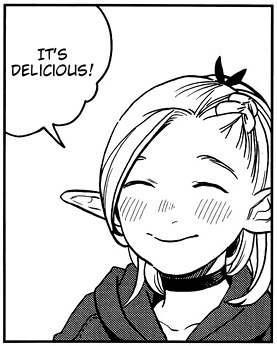
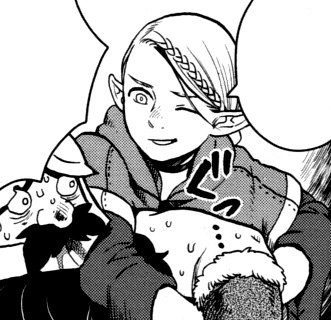
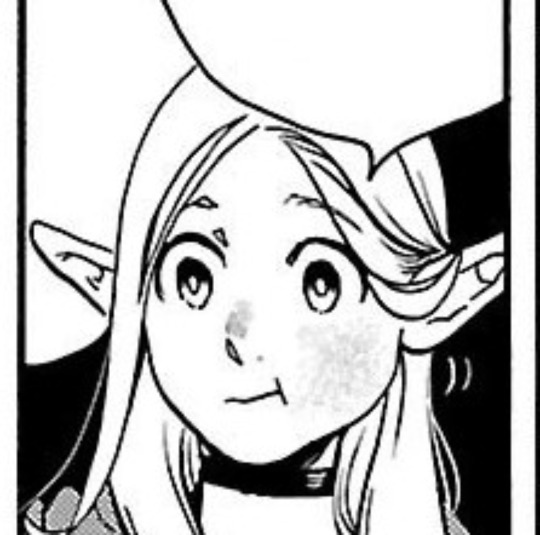
And then the chapter drops a title page of Marcille hearing from Falin for the first time in four years and it's like.
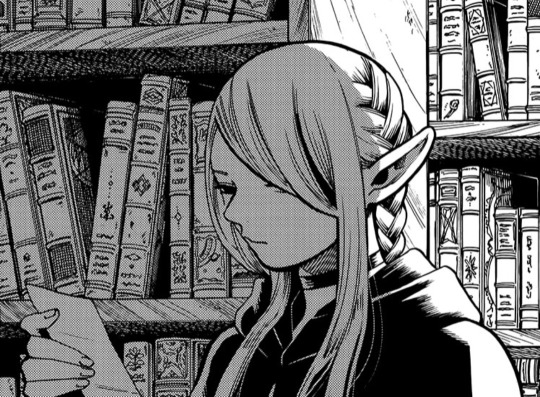
Who is that. Genuinely. Would you even realize that's Marcille without the context clues?
And then the chapter just keeps coming in with the sucker punches.
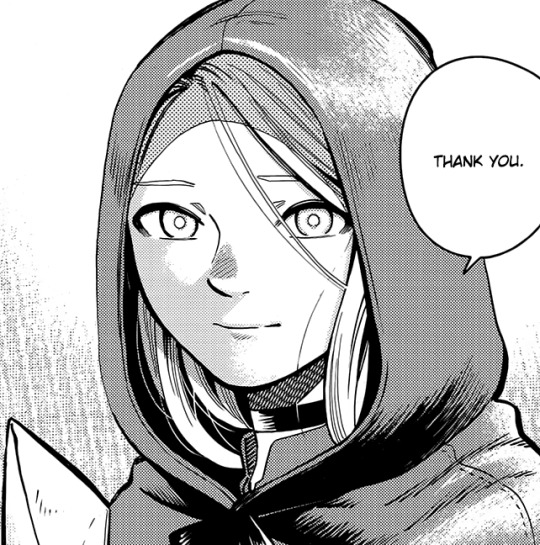
We have SEEN Marcille meet strangers. It was never with this understated of a smile.


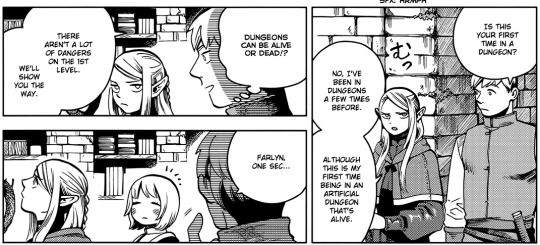
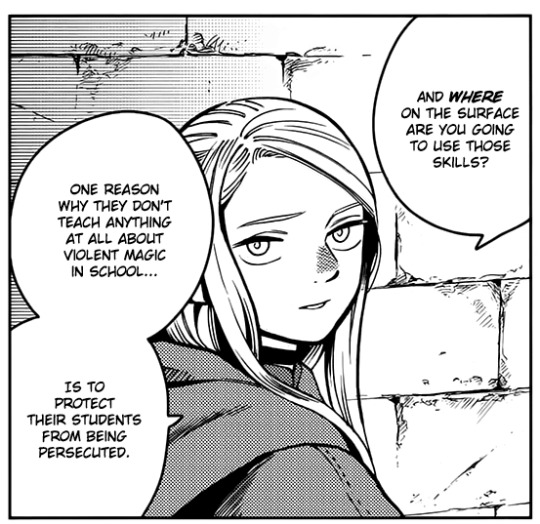
literally who the hell is this. the few times the audience gets to see some Signature Marcille Faces that they're used to is when she finally gets to see Falin again
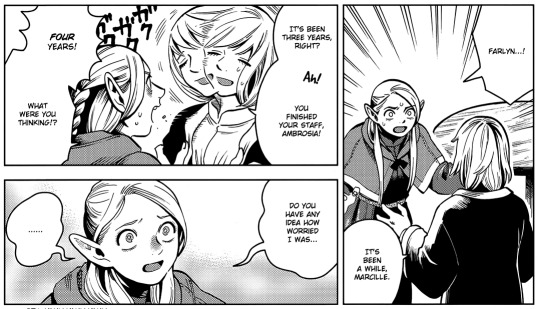
when she's testing out her new spells
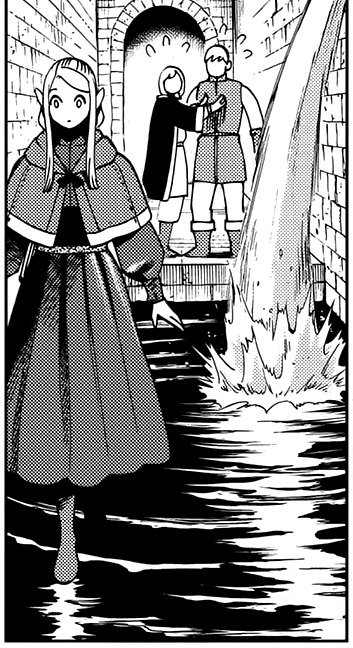
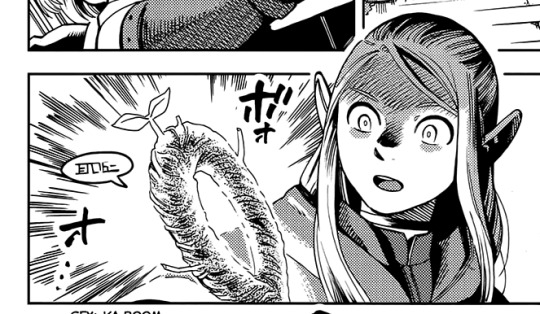

(and when Laios and Falin are fantasizing about her being their damsel in distress, funnily enough)
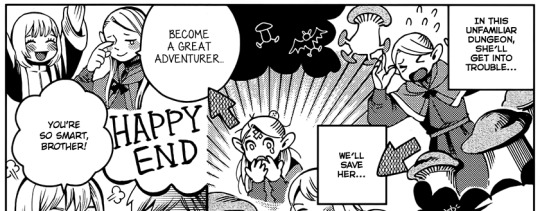
And then finally. Finally you get to a fully recognizable Marcille when she fucking DIES and comes back to life to geek out about necromancy.
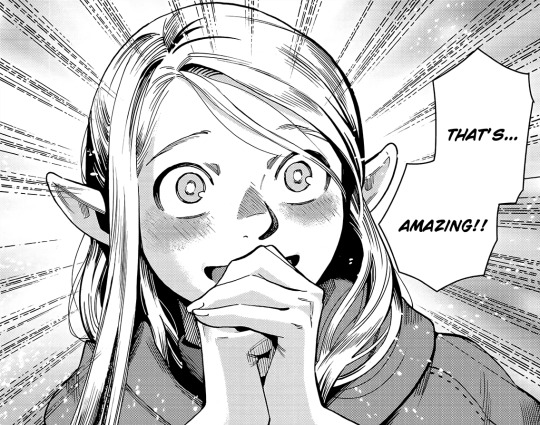

We know she loves magic. We know she loves Falin. So it's not so surprising that she wouldn't be able to keep a mask up when thinking or talking about the things she loves. But why the mask in the first place? Where does it come from? It's tempting to think that, maybe, Falin's departure just hurt her so much that it turned her into a quiet person.
But that's only half true. If you go back, the first instance you see of this incredibly mild personality is actually introduced much earlier, in chapter 17.

What if she was always like that. What if her default after her father died was to hold people at arm's length, to never really emote past being polite and friendly. What if Falin was the first person who was able to bring her out of her shell, and when she left, Marcille just went back to how she was.
And when comparing her detached demeanour with someone else...
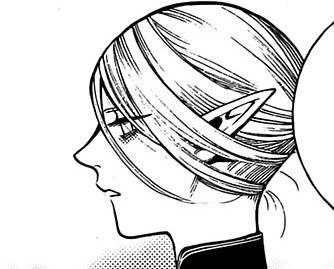
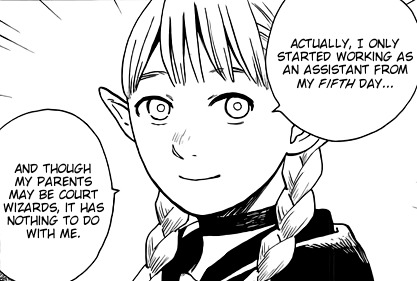
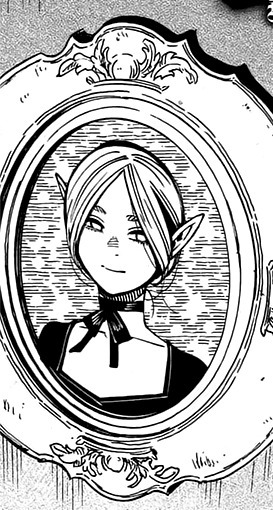
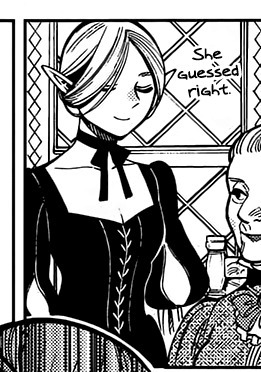
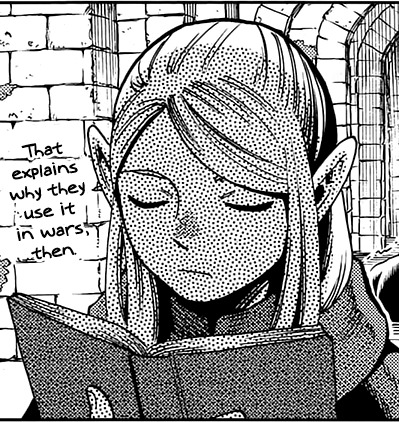
It's not exact, but wouldn't you say there's a resemblance? Wouldn't you think she might be trying her best to imitate what she saw of her own mother working as an accomplished mage?
It would certainly explain why she's hiding behind her portrait in her nightmare, at least.
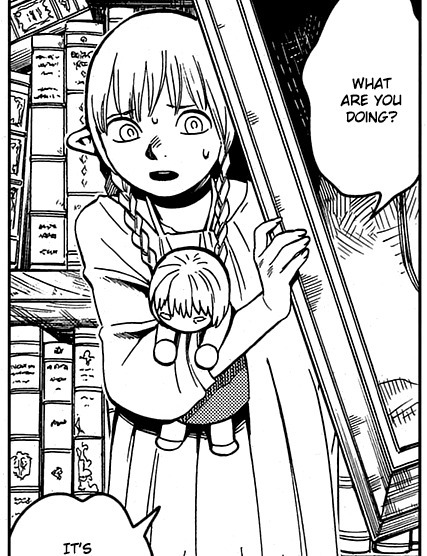
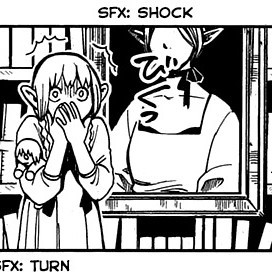
We aren't told that Marcille has been distancing herself from everyone around her using a mature and dignified personality she modelled off her mother. But we sure as hell are shown it, I think.
#marcille donato#dungeon meshi#dungeon meshi manga spoilers#dungeon meshi spoilers#this got so fucking long#it was originally just supposed to be 'haha marcille's old coworkers probably know her as the super serious one'#and then i started connecting dots and it was all over for me#anyway babygirl went right back to depressionville after falin left and it's like. wow. falin doesn't even know how long it's been#that's gotta hurt.#dunmeshi panel meta#marcilleposting#junoposting
5K notes
·
View notes
Text
"I've been waiting for ages for somebody to unmask them."

This moment tends to elicit negative reactions in a first read through, and I've got some opinions about why where Kabru is coming from here actually makes a lot of logical sense. So I thought I'd elaborate on that.
I think people hear this and go, "He thinks they must be hiding something because they gave money to someone? What a cynic." Or "he dislikes them because they did charity?? What's wrong with this guy!". And obviously, a lot, a lot is wrong with him. But I think this makes more sense than it seems at first glance! What people evaluating this judgement miss is why Kabru is paying attention to Laios and co to begin with.
Kabru knows of the Touden siblings because (he's a little bit of a stalker-) he is keeping an eye on all the relevant parties in events developing on the island, in order to be able to guide them to his preferred outcome. This includes adventurers because they are the ones actually exploring the dungeon! He's well aware that something as minor as internal tensions between party members could be key to the historical events that are developing. (He would love the assassination of Archduke Franz Ferdinand.)
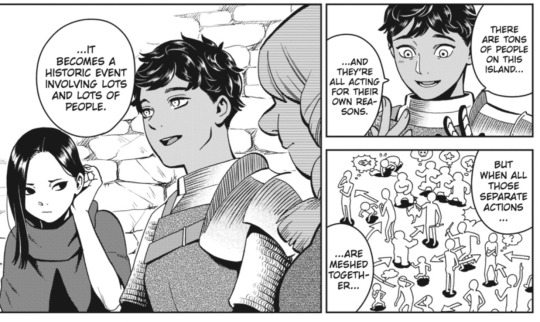
His desired outcome is that whatever the rewards are of breaking the dungeon's curse, whether that's kingship or the ancient elven secrets of dungeons, are claimed by:
A) a short lived person
B) Someone who will be a good, effective leader and/or use those secrets and the power they carry wisely, with foresight, and to establish a political bloc for short lived people.
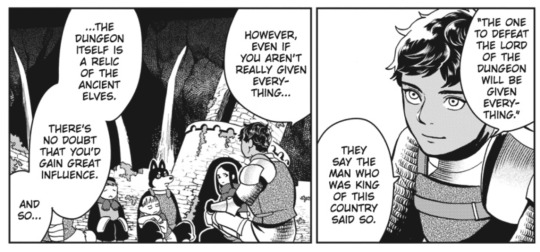
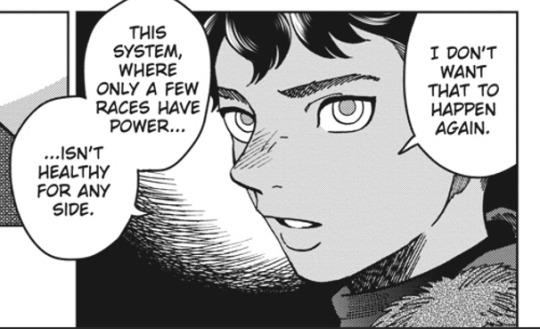
The person he can best trust to do this is, of course, himself. But due to his PTSD regarding dungeons and monsters, he's not able to develop the necessary skills to conquer the dungeon. Once he realises this, he starts looking for someone else who he can support to that end.
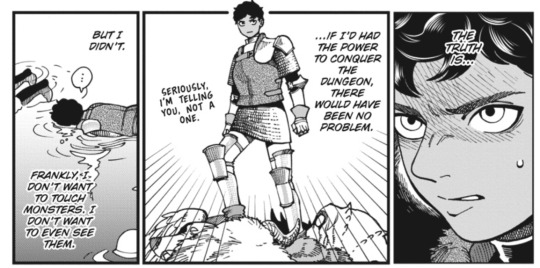
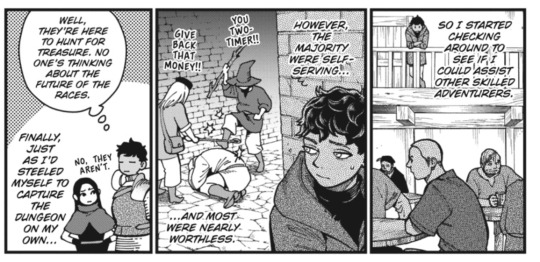
But most of the adventurers don't have any intentions of conquering the dungeon, don't have the skills, or are unsuitable in other ways. In fact, it seems like some potentially suitable people are the Toudens. There are a lot of good rumours about them going around - they actually seem to have a very positive reputation! That's what Kabru means when he says "unmask".

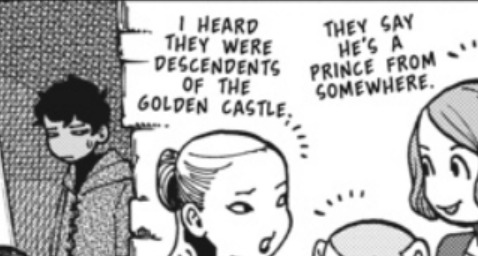

So when Kabru is observing something like them giving money to an old comrade from their gold-peeling days, he doesn't consider it a problem because "they're giving money to this person who doesn't actually need it" or because they must have some dark secret if they act superficially nice. I think he actually understands this situation and what it implies about Laios (in particular) perfectly well.
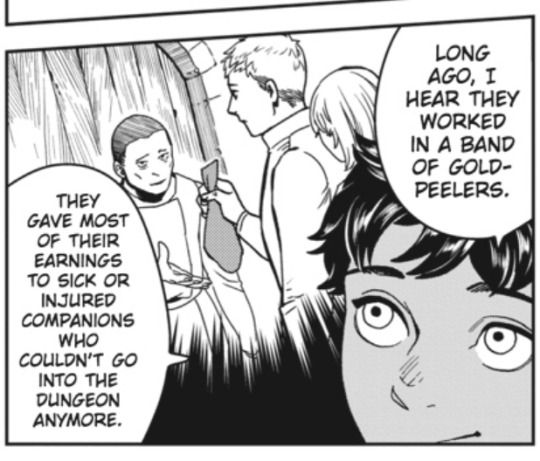
Laios and Falin gave money to an old comrade who got injured and couldn't work. That person then healed up but kept taking their money. Then he used the money to start smuggling illicit goods to the island.
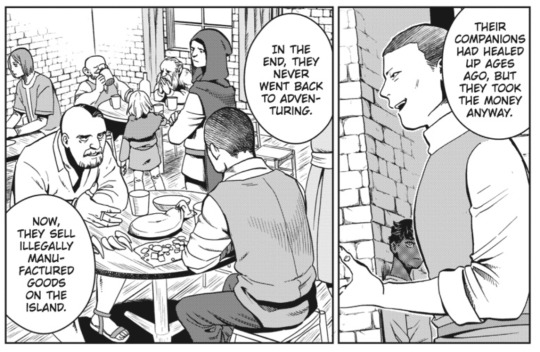
The key is that for Kabru, the problem here is the same as with the corpse retrievers - people using the dungeon's resources to fuel dangerous, selfish, or violent pursuits cause problems for the island, attract more criminals and people with motives other than breaking the curse, and increase the chances of the whole situation ending in tragedy.

Kabru is willing to work with the Shadow Lord of the island if it gets him to his goal - he isn't scrupulous - but the criminal element of the island increasing is something he sees as a major issue.
Also, when you're evaluating someone as a candidate for power, riches, secrets, potentially kingship - then being curious about how the money you give to people is going to be used is kind of a relevant trait!
Interpersonally, Kabru's actually very easygoing - I mean, Mickbell isn't exactly an upstanding guy, is he! But Kabru likes him and they get along well. These traits wouldn't be a problem at all in a friend, or a comrade, or someone Kabru was confident he could use. But he can't get a handle on Laios, and Laios is someone who has the potential to be a major player!
On Laios' end, this is the same as with the marriage seeker who joined their party. She kept asking for things and he gave them to her, because he tries to be nice to others. He even gives her money! It's the exact same thing.
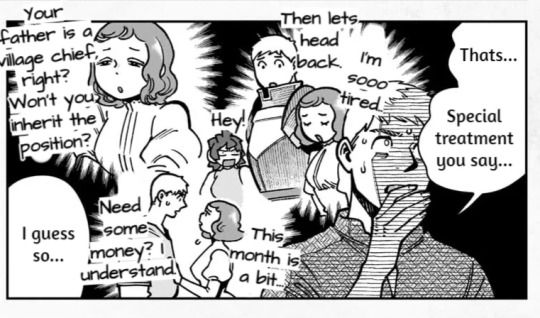
That's fine, but it became a problem because he basically wasn't interested in her motives, didn't notice she was trying to manipulate him, and it also didn't occur to him that the other party members would notice or be affected. We can assume the situation with the gold peeler is the same. When Kabru says that "It's not that they're bad people, they just aren't interested in humans," he isn't wrong.
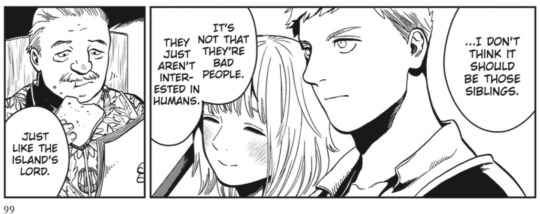
The extent to which this is true of Laios is linked to his autism imo, (because it isn't just disinterest - he genuinely isn't able to notice nonverbal cues that people are lying to him or have ulterior motives) but to a greater or lesser extent I think it's a very common trait. Most people aren't actually that interested in other people who aren't close to them. Kabru is the weird one here. It isn't an issue except as a leader - which is why we see an immediate comparison to the Island's Lord, because that's how Kabru is evaluating them.
And disinterest in/lack of ability with people to the extent Laios exhibits it, it does, actually, make him a worse leader... it's just that as we see in the story, people can help him out. The rest of the party tell him the marriage seeker is taking advantage of him so he tells her he can't give her special treatment anymore. They're pissed and it's a crisis point - he couldn't have recovered their trust without Marcille and Falin - but that's exactly the point. With Marcille and Falin, he was able to recover their trust.
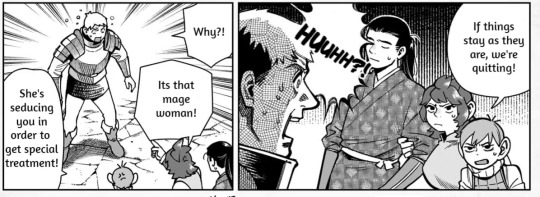
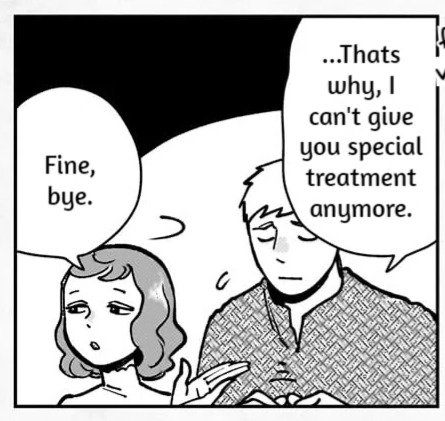
And he has other good traits that make up for it, such as his intelligence, strategic knowledge, open-mindedness and sense of fairplay.
Kabru doesn't disqualify Laios as a candidate based on what he sees about him from afar, though - he still tries very hard to get close to him, obviously hoping that if he manages he can steer Laios to defeat the dungeon and make up for his lack of people-skills in the aftermath. (Which... he does eventually achieve that goal!) He completely fails until the events of the story, so... definitely I think "They just aren't interested in humans" could also partially be a stung reaction to Laios' complete disinterest in him.
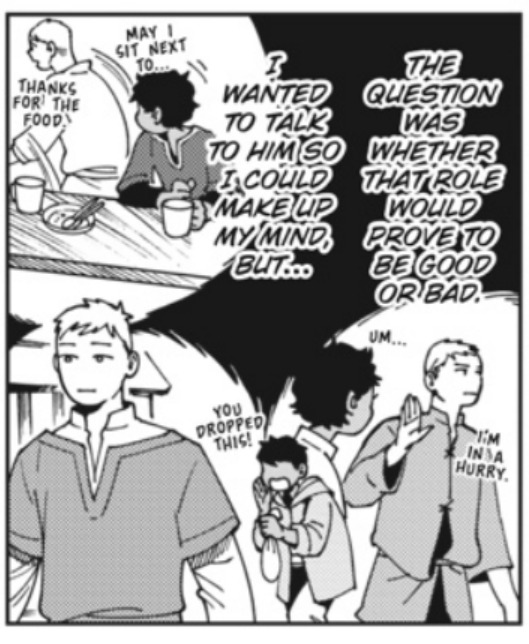
Anyway, that's my read on what exactly Kabru's "issue" with Laios is. Obviously, once he does find out what Laios' true nature is like - about his love for monsters - he develops an entirely new set of fears about Laios' priorities. But since Laios kept that a secret until the start of the story, he has no idea of that yet.
Given all that, I think it's interesting that he says that he doesn't think that the Toudens are suitable to defeat the dungeon, and that he's hoping they'll turn out to be the thieves. As some of his few potential candidates, people who he thinks may play a big role in the island's future, you'd think he'd hope they would be good people!
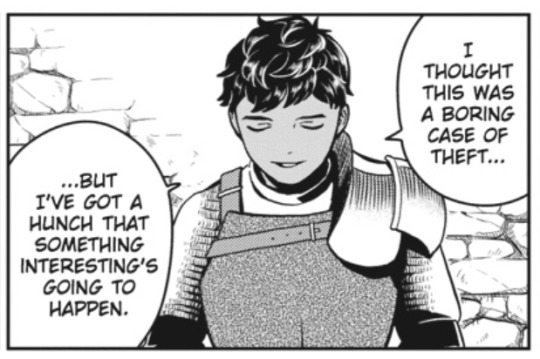
I suppose it's better, in his eyes, because it means that he's involved in something "interesting". They haven't just had their stuff stolen by regular criminals (boring, puts them further away from his goal) - they've been caught up in the beginning stages of "a historic event". The desperate and dwindling group forgetting morals in their quest to retrieve their lost comrade probably appeals to his sense of melodrama. Because he also just... loves drama.
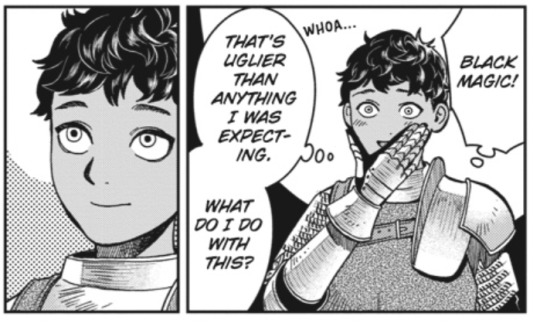
Despite it being "uglier than anything he was expecting", he still pursues Laios as the person he wants to conquer the dungeon pretty much as soon as it becomes clear that he won't be able to do it himself and they are out of time. That's because... well, to be fair, there aren't any other options. And he fits standard A: he's short-lived!
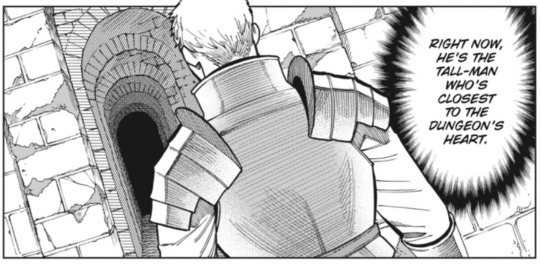
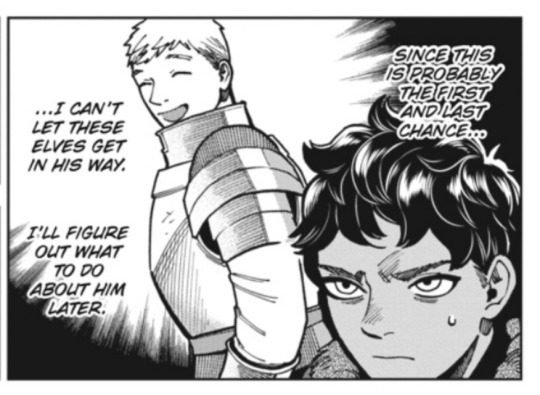
and Kabru still hopes he can fit standard B, too, and be persuaded to use the power he wins for good. No matter how many nightmares he has about Laios, or whether he thinks about killing him. He doubts him, but ultimately he puts his faith in him and seems happy after the manga's ending that he made the right decision.

#dungeon meshi#dungeon meshi manga spoilers#dungeon meshi meta#kabru of utaya#laios touden#labru#laios x kabru#dunmeshi#og post#kabru is such a big picture thinker. and he evaluates people more than he judges them imo#the hater jokes are funny but the people he judges most harshly arent laios and co. they're people like the island's lord.#but you don't see that as clearly because he isn't interested in the island's lord. he understands him. finds him contemptible but useful.#whereas laios lives in his brain rent free because he WANTS to understand him but doesnt quite.#even though he sees the elves as a major threat to his ultimate goals and dislikes the way they treat short lived races#he still understands and evaluates mithrun as an individual based on his own merits#he's one of the characters who is least judgemental in that sense because while he's always making judgements and evaluations#he's also constantly revising them whenever he gets more information#my beautiful machiavellian prince <3#it's genuinely a really laudable way of understanding others imo.#the only problem is that because he's driven towards his goals by his PTSD and survivors guilt#he pushes himself into situations (the dungeon and also interpersonally) that trigger him or even just upset him#without regard for what he authentically wants or his own wellbeing.
4K notes
·
View notes
Text
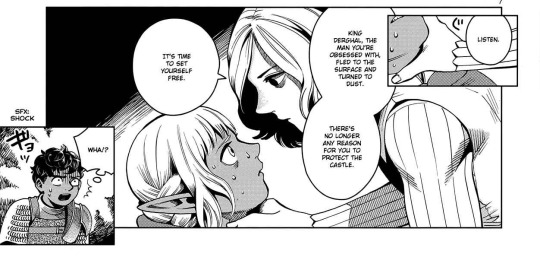

Thistle struggling to reconcile Mithrun saying Delgal’s dead with the illusion he’s been living, cracks forming on memories of a time Delgal refused soup from him.
Thistle in "Delgal’s" arms, refusing soup because he no longer feels needs.
Eating is the privilege of the living

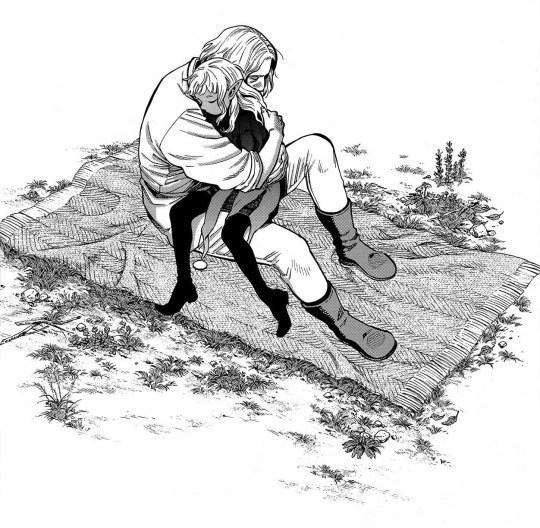
We were supposed to have dinner together
#dungeon meshi#Delicious in dungeon#thistle#delgal#meta#dunmeshi parallels you are famous to me#Spoilers#dungeon meshi manga spoilers#@SOAP YOUR BRAIN#The progression from Delgal sharing an apple with him to Delgal drinking alone…#Dinner table motif you are famous to meeeee#Eating is the privilege of the living and we were supposed to have dinner together
3K notes
·
View notes
Text
"Gojo should've gotten to live as a person-" THAT’S THE POINT. That is the ENTIRE point of JJK. Every single character who died was someone who "should've gotten to" do a lot of things. Riko should've gotten to live for herself, Geto should've had the chance to be a teenage boy given support and safety, Junpei should've gotten to live without fear, Nobara should've had the chance to let people in without fear, Nanami, Yuki, Mai, Higurama, EVERYONE.
Here's the thing, Gojo is on this list. Gojo isn't the exception because JJK at its core is a story about how overarching systems destroy people; bullying, capitalism, sexism, etc. And this system does not need people to run it. Which is why killing Kenjaku didn't stop shit because yeah he started this mess but its grown beyond him. Fuck, it was there before him.
This is also why despite Sukuna & Uraume being the only ones who are actual threats, nothing is better. The cast got rid of the higher-ups, jujutsu tech as it is, is no more. The major families are dismantled. This should be a victory. This is what the Sashisu gen pointed out as the problem but things have never looked more bleak.
Why? Because the problem isn't Kenjaku, Sukuna, curses, sorcerers or curse users. It's the existence of Cursed Energy itself. This has been pointed out multiple times by Yuki. Its the system and Gojo has been complicit to the system for a long, long time. He's also it's victim. Gojo says he's the exception a lot, but as everyone has rightfully pointed out, he was nothing more than a weapon to jujutsu society.
JJK has followed a very clear pattern to every character right from Geto to Junpei to Riko; characters are representatives of systems of suppression, and they will not escape it. I can't recall a single character that's escaped unscathed, much less alive.
Is it disrespectful? Yes. Is it demeaning? YES. There has not been a single character death that's been dignified in JJK. It's all on a scale of bearable to absolutely horrifying. It is genuinely wild seeing people resort to threatening the author AGAIN. Calm the fuck down. You are entitled to feeling upset about how Gojo has been treated but Yuta stans are being calm despite Yuta arguably suffering the "he is a weapon" thing WORSE. It's still a fictional character and JJK's narratives never treated Gojo with any exceptions despite the character saying otherwise.
#gojo satoru#jjk#jujutsu kaisen#jjk meta#jjk 261#satoru gojo#jjk manga#i really like gojo and appreciate his character btw#and i made my peace with 236#i also think we kind of got our answer to geto's question about being the strongest#gojo 100% was forced to give away his body to fight sukuna#but gojo.....isn't his body- isn't his six eyes#in his final moments as gojo satoru-what did he see him as?#we see him in some disembodied form unattached to his body#our kast glimpse of gojo as a oerson is unrelated to his six eyes with a smile
2K notes
·
View notes
Text

That frog goes down the history
#the apothecary diaries#kusuriya no hitorigoto#maomao#jinshi#lakan#apothecary diaries#apothecary diaries maomao#knh#knh episode 19#apothecary diaries spoilers#knh spoilers#neo queen serenity’s posts#jinmao#jinshi x maomao#maomao x jinshi#apothecary diaries jinshi#jinshi apothecary diaries#kusuriya anime#knh maomao#knh jinshi#knh manga#knh ep 19#mao mao#tad#apothecary diaries meta
1K notes
·
View notes
Text
i don't like the growing opinion that people are being 'too hard' on deku for his failing to save shigaraki.
i've seen quite a few people complaining that a lot of the bnha-critical crowd are being too mean to deku for getting tomura killed, arguing that it isn't really his fault, and that hes a 16 year old child soldier who's been failed by almost every adult in his life, why should we be putting all of this on his shoulders? hes just a kid after all?
and the truth is, they're right. deku IS a 16 year old boy whos had the fate of the world thrust on his shoulders. but the story itself just plainly refuses to acknowledge this.
the narrative doesn't acknowledge how fucked up having a school that trains literal children how to be combo cop-celebrities is. it only tentatively acknowledges the fact that a universe having combo cop-celebrities is fucked up, and even then the only people who ever point this out are antagonists, who are portrayed and treated in-universe as untrustworthy. the narrative doesn't care how fucked up dekus circumstances are. the narrative treats deku like hes a fucking messiah here to touch the hearts of the evil depressed villains with his magical empathetic heart of gold before they get blown up or just sent to fucking superhell for daring to challenge the status quote.
deku isn't a person. he's barely even a fucking character at this point. he's a plot device, and a mouth piece for the objectively shitty themes bnha is trying to spout. the themes that tell you that if you're mistreated by society and want to do something about it, you're a villain. that disrupting the status quote and refusing to repent to some random teenage boy spouting empty platitudes at you means you deserve to get sent to fucking superhell. the themes that portray people fighting for civil change as mass murdering supervillains. the themes that look the audience dead in the eye and can call deku the greatest hero to ever live.
deku, who barely spared a second thought to lady nagant telling him the truth about the hero commission. who spouts meaningless platitudes about heroism and morality at nagant, and aoyama, and toga and shigaraki, when even the thought that he should question the world around him comes up. who's constantly talked about as this truly kind, empathetic person, but hasn't spared an empathetic thought to literally anyone who is classified as a villain. who listened to every authority figure around him except the ones who asked him to question his worldview. who saw la bravas tears, shigarakis various breakdowns, himikos plead for understanding, chisakis catatonic state, lady nagants truth, and barley batted a fucking eye. deku, who killed tomura shigaraki.
people don't criticize deku for failing shigaraki because they just hate deku. people criticize deku because of what he represents. because hes a mouthpiece for the atrocious morals and themes of this ideologically rotten manga. because any character he had was chopped up to bits in favor of the incomplete husk we have now. people criticize deku because hes the main character of my hero academia. theres nothing more damning then that.
#my post#bnha#bnha critical#izuku midoriya#midoriya izuku#sorry if this sounds really angry. i mean i am very angry at bnha for being such a nothing burger of empty platitudes and wasted potential#but like. that was extremely predictable#bnha wanted to be more than it was willing to put effort into being and so now its just. worthless#so this is just kinda a vent on all my angry feelings abt dekus failure as a character and a protagonist#tomura shigaraki#my hero academia#boku no hero academia#mha critical#my hero acedamia critical#boku no hero acedamia critical#deku#bnha meta#i mean techinally#mha#mha meta#bnha manga spoilers#bnha manga#long post#well longish
1K notes
·
View notes
Text



oh.



oh.


OH.
#like not to be captain obvious but#the girls are foilinggggg#hxh spoilers#hxh manga spoilers#hxh mangacap#succession war arc#hxh meta#kurapika#yorknew city#phantom troupe#hxh#hunter x hunter#screeds#hxh 406#chrollo lucilfer
632 notes
·
View notes
Text
One little thing I love about spy is that when two characters are biologically related, Endo knows how to draw them physically similar. They don't all look the same even though it's the same style of drawing
I love 😭💖
Yor and Yuri


Melinda and Damian


Donovan and Demetrius



Even Twily and his dad




I never noticed how similar they are, the sad thing is that Twilight probably isn't aware of that because he doesn't remember his dad's face 😔
#spy x family#loid forger#agent twilight#twilight#yor forger#spy x family manga#sxf manga#yuri briar#melinda desmond#damian desmond#demetrius desmond#donovan desmond#sxf meta
2K notes
·
View notes
Text
kabru and the dungeon lords
kabru is a very critical character to dungeon meshi for a thousand and one reasons, and not merely for his status as the point-of-view character in the story's b-plot. kabru represents the compass by which dungeon meshi's world works. he has big-picture motives that involve the entire world, much grander than the original a-plot of "let's save falin."
he is our classic hero, a character who suffered great personal tragedy and must ensure that no one suffers the same fate. as such, he is a great parallel for dungeon meshi's most integral characters:
the dungeon lords themselves.
🚨manga spoilers ahead.🚨
thistle
picture this: you are a child, separate from anyone else in the world who looks like you due to circumstances beyond your control. you are taken by pale-skinned adults who try to treat you well; who clothe you, feed you, and put a roof over your head.
it is not enough.
who am i describing - kabru, or thistle?
kabru-thistle parallels focus on their shared past as trans-racial adoptees. their shared experiences are not a universal one to all trans-racial adoptions in the dungeon meshi universe: the floke twins are treated well by their gnomish foster (grand)parents; allowed to be children while they are children and treated as adults when they are adults.
not all trans-racial adoptees are given the same courtesy. kabru was raised by an elf who infantilized him, even once he was fully-grown. milsiril did not always know what kabru needed from her, so she defaulted to treating him the way she would treat an elf his age rather than understand what his age meant as a tall-man.
by contrast, thistle was raised by tall-men. freinag saw thistle as a son and so he and delgal thought themselves as brothers. but as delgal aged and matured, thistle remained stagnant. eventually, delgal's relative age surpassed thistle's- but no one could even conceive of that, because thistle's numerical age made the tall-men around him treat him as an adult rather than a teenager.

they both feel immense responsibility for the tragedies suffered by their people. kabru explicitly believes there must be a "reason" he survived utaya and that the reason was to destroy the dungeons to ensure it never happened again, and thistle IS the reason the golden country survived their war, and why eodio made it to adulthood all.

kabru and thistle are characters pre- and post-accomplishing their goals. kabru has yet to assume total responsibility; thistle already has.
they must save them- they must protect them all.
[🩵]
marcille
once upon a time, a child lost a parent before they were ready to, and the trajectory of their life changed forever. desperate to understand, the child grew into an adult and dedicated themself to preventing their personal loss from happening to anyone else ever again. as a result, they looked downward into the dungeon's depths.
they will find the answers they seek.
who am i describing- kabru, or marcille?
marcille and kabru stand as important secondary figures to laios, our main protagonist. in the words of another excellent post, they are the heaven foils to laios's earth. where laios is grounded and thinking about the here and now, they have both identified big picture problems plaguing their world and pursue these goals with intense fervor.
however, these goals have been diverted by censorship. marcille cannot access information about historical ancient magic through traditional means and the elves won't tell kabru what happened to utaya's dungeon, so they both decide to go and do something with their own two hands.

entering the dungeon is a step towards their grander goals, which are both rooted in opposition to long-lived supremacy. critically: the solutions they come to are vastly different.
marcille's solution is very fantastical - "fixing" everyone's lifespans by making EVERYONE long-lived (though her original solution seemed to be more grounded; being a lord gave her the chance to indulge in the full fantasy).

on the other hand, kabru wants something more concrete and based in the real world. he wants to use the dungeon as a means to an end before destroying it entirely, whereas marcille wants the dungeon to be the end. hers is a magic idea borne about by escapism, while kabru wants to solve a societal problem with something tangible to improve the lives of the shorter-lived without resorting to the fantastical.

(note the similarity in these compositions!)
kabru and marcille are aiming for the heavens; they have chosen to act as stewards to bring about a better future for as many people as possible.
but eventually, they must crash back down to earth.
[🩵]
mithrun
a long time ago, a dungeon lord met their maker and the demon ate its fill, but failed to breach the surface. carnage and destruction was sown in its wake. in the aftermath, a survivor dedicated himself completely and utterly to the cause with no room for reproach.
the dungeon will be conquered. and if he has it his way, it will be conquered by his hand.
who am i describing- kabru, or mithrun?
if thistle represents kabru's past and marcille represents kabru's present, than mithrun represents one branch of kabru's future- and a rather bleak one.
mithrun has suffered great tragedy at the hands of a dungeon and, as a result, dedicated himself to be what he believes is his one remaining desire: to finally be consumed entirely. he thinks he has nothing else to live for, so he runs himself ragged every single day just to inch closer and closer at a chance to kill himself while pursuing his goal.
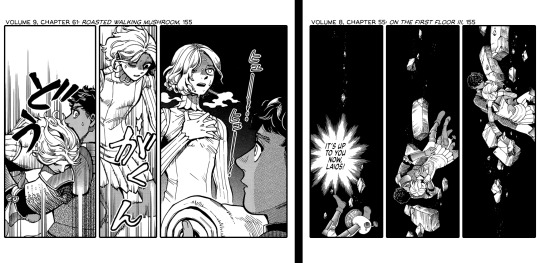
this great fervor is one that kabru artificially mimics long before meeting mithrun. kabru is willing to die for his goals. he does die for his goals. he thinks he is going to die without a chance for resurrection when he sabotages the canaries, which is why his 'last' thought is "it's up to you now, laios!"
remember: kabru believes his survival has to serve a purpose- his survival must have been 'worth it.' in order to make his own survival palettable, kabru dedicates himself entirely to the dungeon's destruction without long-lived intervention as a means to avoid repeating utaya's fate. kabru self-deprives, fails to care for himself, and he is constantly killed in pursuit of his goal to conquer the dungeon before people like the canaries can. while kabru has desires, he only indulges in the one that has guided him for over a decade.
functionally, he and mithrun are identical when they first meet.
kabru has purposefully deprived himself of his desires beyond ensuring another utaya doesn't happen again, and mithrun is proof of what happens when you follow that to its logical conclusion. however, over the course of their week together and the final arc of the story, kabru makes the choice to divert from mithrun's fate.
kabru looks into the eye of his ultimate goal, and in the culmination of his arc, ultimately refuses this destiny.

what do you want, kabru? are you hungry, kabru?
kabru indulges. instead of blindly following through the dungeon's destruction and sacrificing what he wants for the greater good, he wants, and he befriends laios instead of ending his life. he leaves mithrun's fate behind...

...and senshi- one of the most steadfast representatives of dungeon meshi's thesis- sets mithrun on a path where he, too, can learn to chase after newer, healthier desires.
[🩵]
laios
one day, a child was hungry for the answer to a question: "what is wrong with me?"
there is no satisfactory answer. a mother and a sister believe nothing is wrong, but everyone else in their small world disagrees. those eyes, that personality- something must be wrong.
but there is no recourse.
so, these children endeavor to focus on the world around them in ways that won't hurt them. one chooses to study and love humans, because humans are beautiful and complex and amazing. the other chooses to study and love monsters, because monsters are easier to understand and always obey one simple rule: eat or be eaten.
they double down on their interests soon enough. monsters have hurt one child enough, and humans can't get enough of hurting the other.
you know which one is kabru. you know which one is laios- dungeon meshi's fabled narrative foils.
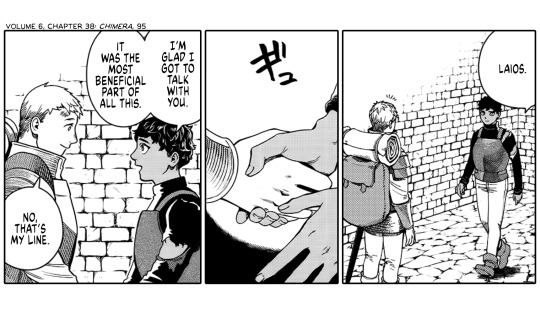
laios and kabru are as textually close to being explicit foils as humanly possible. the first sentence of kabru's page of the adventurer's bible says it perfectly: "in every possible way, he's a contrast with laios. laios loves monsters, while kabru has an endless interest in humans" (56).
in basic terms, a foil character is a character with traits that contrast against another's, typically the main protagonist. this contrast serves to highlight the themes of the story, and we see that illustrated perfectly with laios and kabru.

where kabru has denied himself care, laios gives it to him without thinking. where laios believed no one could ever want to be his friend, kabru proves him wrong. the nature of nourishment and human connection are both critical foundations to dungeon meshi's story, and the main character struggling with human connection while his foil struggles with nourishment is no mistake.
kabru wanted to be laios's friend all along. the b-plot of dungeon meshi is driven by kabru's unconscious desire to understand and ultimately aid one inscrutable laios touden. the reason they cross paths at all is because kabru wants to meet him! he takes a chance when toshiro appears and sees his chance through.
but kabru doesn't realize it until he's already said it. he betrays himself, completely unaware that his supposed interest in the touden siblings skews a little more to the right than he could have possibly known.

killing laios would have been the ultimate preventative measure. he was yet to be dungeon lord, and with the canaries intent on handling marcille, kabru could have dealt with him right then on that cliff. but kabru doesn't take the opportunity because he doesn't want to.
he'd rather befriend laios than see him dead, and he takes the chance by the sleeve and doesn't let go until he is listened to.
and in the end, kabru is rewarded for his leap of faith: laios puts an end to the demon. laios has ensured that another utaya will never happen again.
laios saves the world.
all because kabru allowed himself to be selfish.

#dungeon meshi#delicious in dungeon#dungeon meshi meta#kabru of utaya#kabru dungeon meshi#laios touden#marcille donato#thistle dungeon meshi#mithrun of the house of kerensil#kabru#laios#marcille#thistle#mithrun#dungeon meshi manga spoilers#long post#my meta#mine#talking#YES i re-typeset all of the panels. for consistency.#because i'm really normal. obviously.#kabuposting
562 notes
·
View notes
Text
Hold on
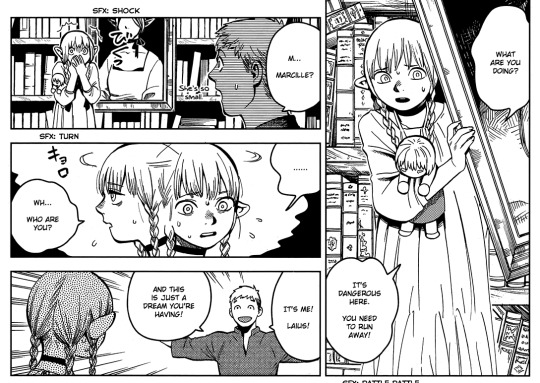
Was she


Hiding behind a portrait of her mother????? I know I joked about her emulating her mother to put off an air of a competent woman and mage but??? Did Ryoko Kui just straight up make the most straightforward visual metaphor of her feeling like a child behind the demeanor that she directly modelled off her mother??
#dungeon meshi manga spoilers#dungeon meshi spoilers#marcille donato#im going to lose my mind#they never explicitly explore marcilles feelings toward her mother very much but its there ITS THERE its all there#the little details#where she clearly holds her mother as her prime role model#consciously or not!!!#dunmeshi panel meta#marcilleposting
2K notes
·
View notes
Text
Kabru, impossible mutual understanding & unknowable objects
Despite his concerted and constant efforts to understand other people, it’s established in a few extras that Kabru believes that true mutual understanding between certain different races is impossible. Specifically, between long-lived and short-lived races, and between humans and demi-humans. Partially, we can trace this conviction back to specific hang-ups caused by his life; the trauma of the Utaya disaster, prejudices he carries from his childhood, and his experience of racism among the elves. In this “little” essay, I’m gonna discuss how I think those experiences formed this belief, how it comes out in his actions, and how some of his actions seem to contradict it. The question of whether it’s possible to reach mutual understanding with other living beings despite our differences is one of the core themes of the manga, and I’ll also touch on how this aspect of Kabru’s character links to that.
Seeking understanding
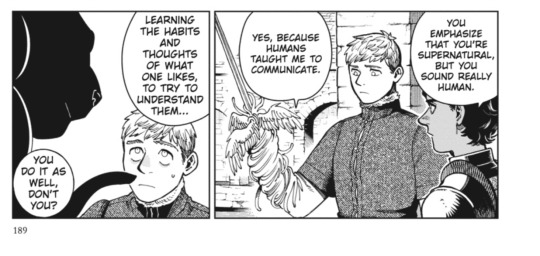
Kabru is a character who devotes a huge amount of time and effort to understanding people, and he is very good at it. In his internal monologue, we can tell how advanced and complex his skills of analysis are. He is able to read a huge amount of information just from looking at people's faces and body language.


People are, to him, what monsters are to Laios. This is something that's been expanded on at length in other, excellent meta. It's the fact that they're foils; it's the fact that Kabru is also very easy to read as autistic, with a special interest which is the opposite and parallel of Laios'. It's something that came out of trauma and alienation, as Laios' special interest in monsters also began as a coping mechanism.
The complicated origin of this "love" for monsters and for people comes through, I think, in the fact that one of the places we see both characters use their fixation is in being very, very good at killing the thing that they love. This also ties into the idea that loving something isn't even remotely mutually exclusive with using it to sustain your own survival; using it for your own purposes; hurting it or killing it. Love can be, and often is, violent, possessive and consumptive. This understanding is part of what makes Kui's depiction of interpersonal relationships so compelling to me.
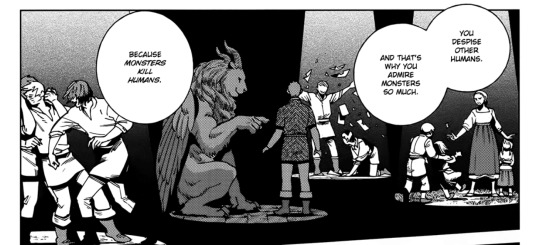
While Laios fixated on monsters and animals to seek a place of escape, in both his imagination and his self-image, from the humans who he couldn't understand and who couldn't understand him, Kabru seems to have fixated on understanding people in order to navigate the complex, socially marginal places that he has been forced into throughout his life. As an illegitimate child raised by a single mother with an appearance that marked him out as different to the point his father's family wanted to kill him, and a tallman child raised among elves who didn't treat him as fully human and wanted him to perform gratefulness for that treatment – treatment that, after he met Rin at age 9, he certainly always understood could be a lot worse – his ability to work out what people wanted from him, whether they were friendly or hostile or had ulterior motives, wasn’t just an interest. It will have been an essential skill.
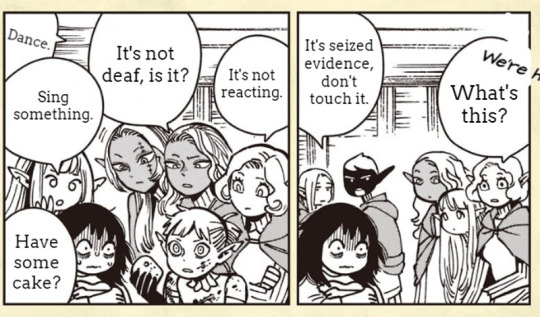
Milsiril, I think, was a flawed parent who tried to do her best by Kabru and did a lot of harm to him despite her best intentions. She may have treated him much better than an average elf would have, but like Otta and Marcille's mother, there are other elves with different outlooks on short-lived races. How would they judge her treatment of him? We don’t have any insight on what it could be, but to be honest, the person’s whose opinion of her I’d be most interested in knowing is Rin’s.
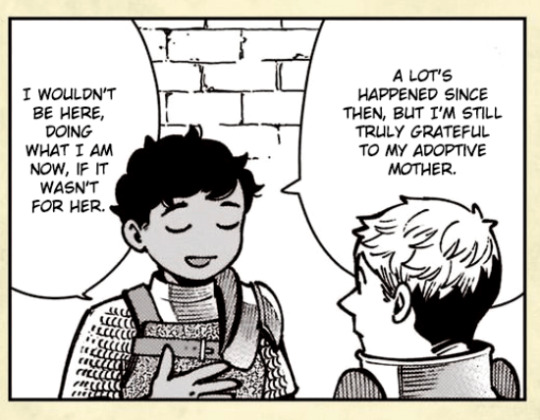
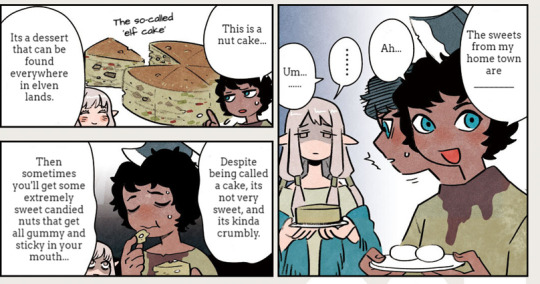
But even if she'd been perfect, living as an trans-racial adoptee in a deeply hierarchical nation with a queen who is a 'staunch traditionalist' who wouldn't even acknowledge the existence of a half-elf like Marcille (according to Cithis) is an experience that would deeply impact anyone.
Elves & Impossible mutual understanding
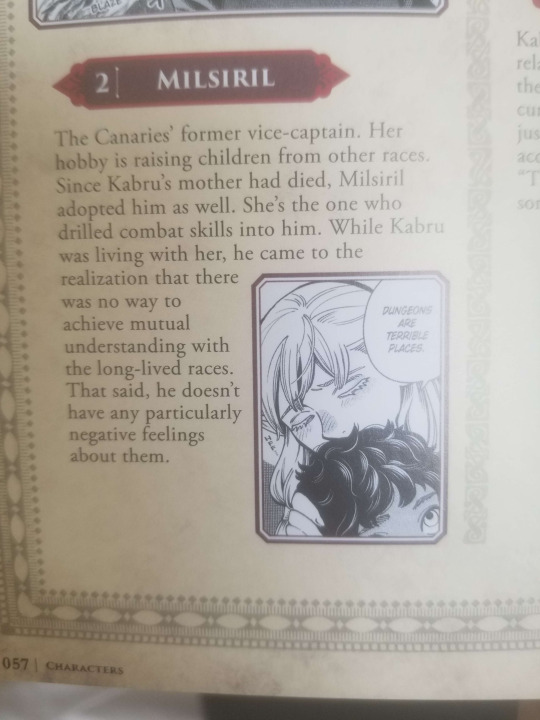
While Kabru was living with Milsiril - in other words, while living in the Northern Central Continent - he came to believe that "there was no way to achieve mutual understanding with the long-lived races."
This is evident in his political project: he wants short-lived races to have ownership over the dungeon's secrets. Despite his dislike of the Lord of the Island, he's a useful bulwark to stop the elves taking over. Despite his doubts about Laios, Laios needs to be the one to defeat the dungeon, because if he doesn't the elves will take over.
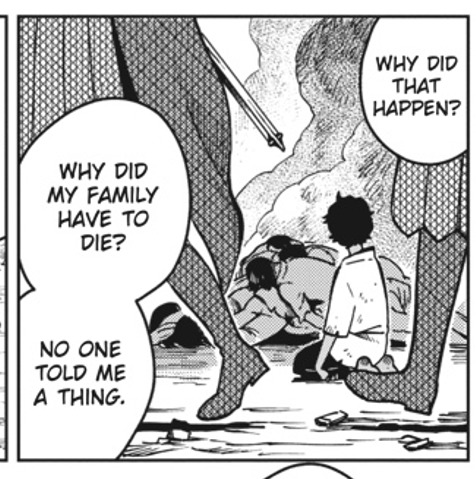
Kabru still carries a deep scar from Utaya, one that was exacerbated by the fact that he never got an answer to any of his questions about what happened or why. This, despite the fact that Milsiril knows about the demon and how it works. Do you think Kabru, with his social perceptiveness that borders on the superhuman, wasn't aware that she knew more than she would tell him?
Given that, the fact that he gets to a place where he "doesn't have any particularly negative feelings about [elves/long-lived species]" .... well, to put it bluntly, I believe that he thinks that's the case, but I kind of doubt it. After all, if he did have resentment, of Milsiril (someone who was his primary provider and caretaker since age six, and who despite her flaws, loves him and who I do think he loves) or of elves (who he has had to play nice with for most of his life, in order to survive, and will still have to play nice with in order to achieve his goals, since they hold all the power) what would that do except hurt him and make his life harder? Kabru is Mr. Pragmatic, so I don't think he'd let himself acknowledge any such feelings he did have. Exactly because he can't acknowledge them, they're well placed to get internalised as beliefs about the Fundamental Unchangeable Nature of the World.
However, these stated beliefs seem to contradict his actions. Despite his belief in the impossibility of forming a mutual understanding, he certainly seems to try to understand long-lived people, just as much as he does short-lived people. There's no noticeable difference between his treatment of Daya & Holm versus Mickbell & Rin that isn't clearly down to their relationship with him. His skills of human analysis were honed and developed while living amongst elves, and as soon as he's alone with Mithrun he immediately sets to understanding him - his interests, his motivations, his needs, and his past.
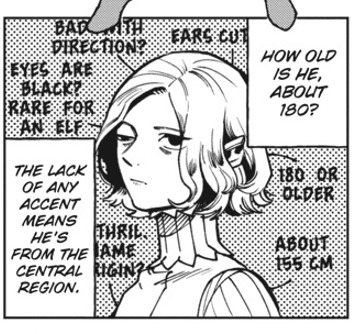
He treats him considerately and without bias, and despite the fact that Mithrun conquering the dungeon for the elves is both a reenactment of a core part of his childhood trauma and a political disaster for his aims, that doesn't seem to colour his perspective on Mithrun negatively at all.
This is something I find extremely laudable about Kabru, and it's another way he parallels Laios. He seems to understand that people, as a rule, (in Laios' case, he understands this about monsters - and eventually, all living beings) will act in their own interests, and if those interests conflict with yours, might harm you. But that's just their nature, and it's not something that should be held against them; you're also doing the same thing, after all. The crux of Laios' arc is precisely that he has to accept the responsibility of hurting someone else in order to achieve what he wants.
Kabru is deeply concerned with his own morals, what he should and shouldn't do, but mostly in the context of responsibility for the consequences - a responsibility he takes onto himself. He isn't scrupulous about what he needs to do in order to create the outcome he wants, but if he fails to create that outcome, then....
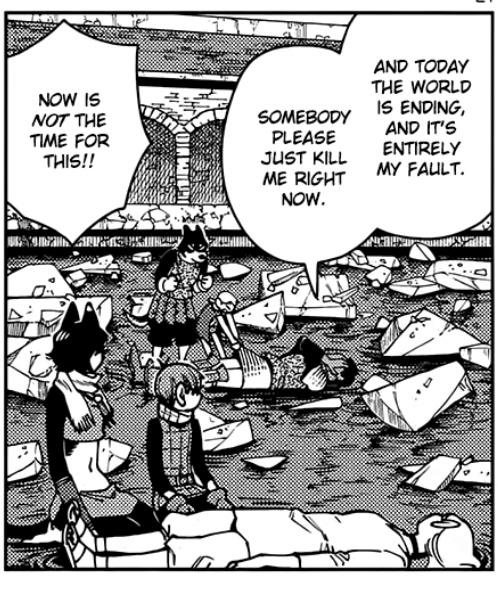
He blames himself to the point of thinking he should die. He doesn't blame Laios, or seem at all angry with him, despite concluding he should have killed him to prevent this outcome. That's because in his eyes, ultimately Laios was going to act according to his own nature, and it's Kabru's fault for not understanding that nature well enough. He's extremely confident in his ability to understand and predict others, (including elves and other long-lived people). Then, where does his conviction that mutual understanding is impossible come from?
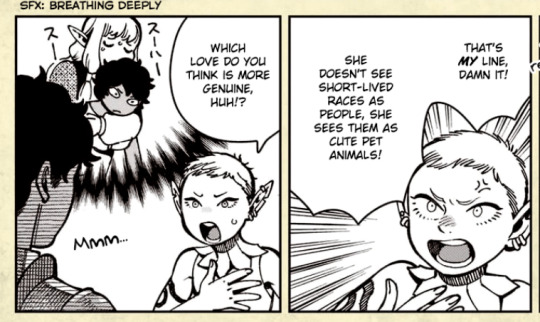
Partially, it's the "mutual" part. I'm sure Kabru, who isn't able or willing to deny Otta's insinuation that Milsiril saw him more like a pet than a son, has felt that his full interiority, the depth of his feelings and his ability to grow, act, and think as a fully equal being, was something that the elves around him just couldn't grasp. Because that was their excuse for it, he came to understand this as a gulf between short-lived and long-lived beings, an inevitable difference in outlook caused by their different lifespans.
This experience might be part of what leads to his iconic “fake” behaviour. He trusts his ability to understand others, but if they aren’t able to understand him, then there isn’t any benefit to being honest about his feelings and thoughts. If his attempts to reach mutual understanding with his caretakers were never able to be fulfilled, then it isn’t any wonder that he reacts with such surprise and horror at blurting out his desire to be Laios’ friend.
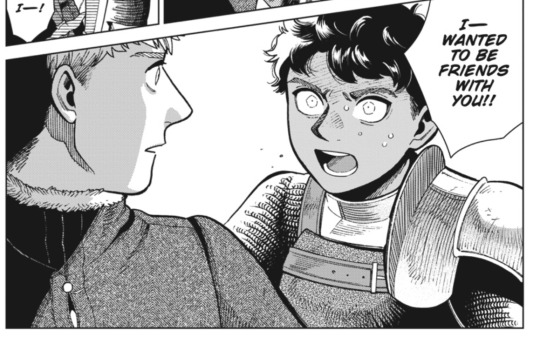
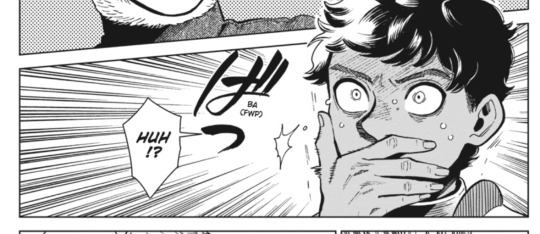
In his experience, making yourself vulnerable in that way only leads to being hurt. Soothing him, hushing him, lying to him, talking to him like a child that isn’t able to use proper judgement – that’s an inadequate and deeply hurtful way to respond to genuine distress, the desire for autonomy, or disagreement. Ultimately, I think that’s why he comes out on the side of being grateful to Milsiril; because she did equip him with the skills and knowledge he’d need to reach his goal, and let him go.
Though he could understand them, they couldn't understand him. To the extent that was true - which I'm sure it was - it wasn't due to anything about lifespan. It was due to the elves’ racism, and the solipsitic mindset & prejudiced attitude that it caused them to approach him with.
Because, if it needs to be said, the idea that there is an unbreachable gap in understanding between the long-lived and short-lived species is not true. Marcille and Laios have a much greater difference in lifespan than any full elf from any short-lived person, and they’re able to understand each other – maybe not perfectly, but better than many other people who are closer in life-span to them.
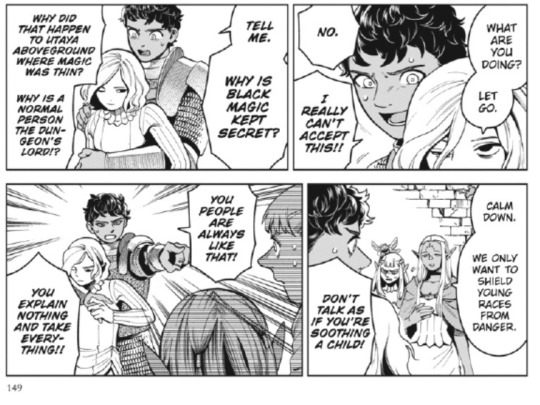
That doesn’t mean that I think Kabru is wrong about this, however. Because there’s an interpretation of his statement that is reflected in his actions and is true. When he talks about his problem with elves, it’s not just their attitudes: it’s their power, and what they use it to do. They “explain nothing and take everything”. Though it’s presented in the guise of ‘guiding and protecting’, in fact it’s a simple case of a powerful nation using their military power, wealth, access to resources, and historically stolen land – including the island itself – to protect their own interests and advance their own agenda. That’s why they’d be able to show up, seize the dungeon, and forcibly take Kabru’s party and Laios’ party to the West. If Kabru wants to stop that from happening, or change that status quo, persuasion or a bid to be understood would be completely pointless. Between the political blocs formed by long-lived species and the interests of short-lived species, “mutual understanding”, given their current, unequal terms, would be impossible. This is something that we see reflected in Kabru’s actions; before he asks his questions about the dungeon, he grabs Mithrun as leverage. He never really attempts to persuade the canaries to see his point of view, because that would be pointless: they’re agents of the Northern Central Continent’s monarchy, and will act in its interests regardless of any individual relationship with him.
I don’t think Kabru sees the different dimensions of this belief of his in quite such clear terms, however, as is evidenced by the other group who he thinks it’s impossible to communicate with.
Demi-Humans & Unknowable Objects
The other place that we see his conviction about the impossibility of mutual understanding is in the kobold extra.
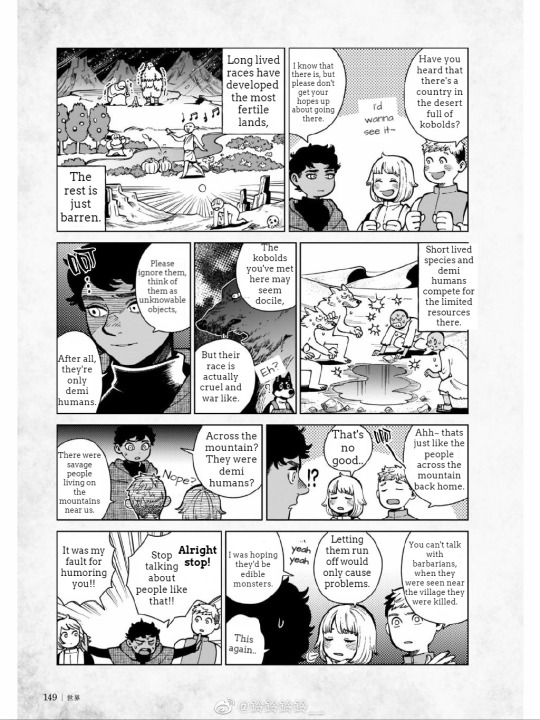
I'm including the whole thing, because I think it's an excellent and clever piece of world-building. Aside from what it says about Kabru, which I'll expand on shortly, what this extra does is deconstruct and call into question the usual "fantasy ontological biology" present in these sort of DnD-like settings. Essentially, the kind of worldbuilding where a race (such as kobolds) can be described as war-like, and that's establishing something essential about their biological nature. That's common to the point that if Kui didn't include this, some people would probably come away thinking that's the case about, e.g., the orcs.
But here, despite what Kabru is saying, the information the reader actually gets is:
the conflict between short-lived humans and demi-humans such as kobolds is mostly over access to material resources that they need to survive.
These resources are scarce because powerful nations, such as the elves, have monopolised them.
Kabru, who has grown up in a place at the centre of these conflicts, ascribes essential, negative traits to a cultural group which was in direct conflict with his own. Communication with this other group is impossible; they aren't people, they're more like objects.
oh yes! just like this conflict between groups of tall-men, a conflict which the reader will immediately interpret as more clearly analogous to real-life racism. Our other protagonists also carry prejudices from growing up in a place where a marginalised group was in conflict with the dominant group over scarce resources. It's definitely impossible to communicate with these people, and you can only kill them.
Woah, when you say it like that, it sounds pretty bad!
But also, nobody walks away having had a realisation or unlearned their prejudices - because they don't have the tools they need to do that work. Yet. I do think, to an extent, it could happen - especially with Kabru, since it's suggested in the epilogue that Melini might become a safe-haven for demi-humans.

To focus in on Kabru, the key here is his statement that you should think of demi-humans as "unknowable objects". Even his extraordinary powers of understanding have seemingly hit a limit. Part of this is just inherited prejudice, and doesn't need to have a complicated psychological explanation, any more than the elves who were prejudiced against him need one.
But also... this is probably somewhat linked to the way demi-humans seem to be considered "pseudo-monsters". They're the place that the strict delineation between the human and the monstrous is permeated. Laios, who is not interested in humans, remembers and is excited by Kuro. Chilchuck and Laios argue over whether it's OK to eat a mermaid. Kabru's prepared to (pretend to) roll with the idea that Laios ate the orcs.
But these are people, aren't they? Of course, this is a social construction, as we see from the fact that in the Eastern Archipelago, the label of "human" is reserved for tallmen, but in most of the rest of the world it depends on some obviously arbirary classification based on number of bones; "demi-humans" aren't in any essential way monstrous, except to an extent in their appearance, and physical location - due to their marginal social status, they're pushed out to live in unsafe places such as dungeons.
Therefore, Kabru's view of demi-humans as fundamentally "other", unable to be understood - monstrous - could be read as akin to abjection, the psychoanalytical concept described by Julia Kristeva. In order to create a bounded, secure superego, that thing which permeates and calls into question the border between self and other, human and animal, life and death, is rejected and pushed to the margin.
“Not me. Not that. But not nothing, either. A "something" that I do not recognize as a thing.[...] On the edge of nonexistence and hallucination, of a reality that, if I acknowledge it, annihilates me. There, abject and abjection are my safeguards. The primers of my culture.” (Kristeva et al., 1984, p. 11) “It is thus not lack of cleanliness or health that causes abjection but what disturbs identity, system, order. ” (Kristeva et al., 1984, p. 13) “The pure will be that which conforms to an established taxonomy; the impure, that which unsettles it, establishes intermixture and disorder. [...] the impure will be those that do not confine themselves to one element but point to admixture and confusion.” (Kristeva et al., 1984, p. 107) (discussing food prohibitions in Leviticus)
This is both (due to its affinity with food-loathing and disgust) a very fruitful concept to apply to dunmeshi, and a psychoanalytical theory which I wouldn't exactly cosign as True Facts About Human Psychological Development. You may also know the abject from its utilisation in the classic essay "Horror and the Monstrous-Feminine" by Barbara Creed - that's a lot more approachable than Kristeva if anyone's interested.
Key here, though, is that through the symbol of the "demi-human" is embodied a step between "human" and "monster" - and that's a prospect that puts at risk the whole notion of an absolute separation between those two categories in the first place. To Laios, that's something wonderful, and to Kabru, it's terrifying. We can see this principle further embodied in the relationship both characters have with the notion of becoming monstrous.
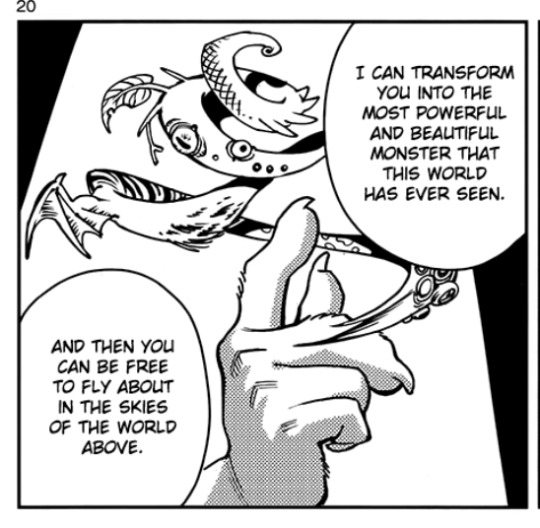
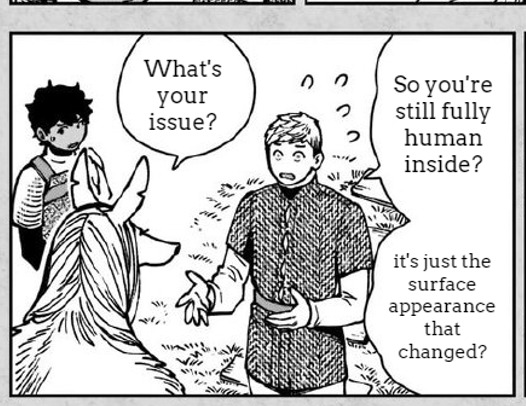
To Laios, this is transcendent, and represents a renunciation of everything human - in fact, if it didn't, it wouldn't "count".
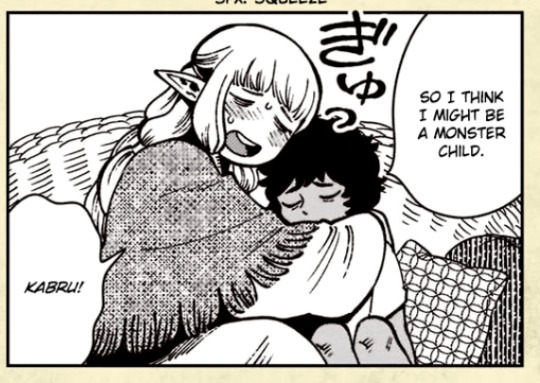
To Kabru, it's a deeply-held fear, established by his childhood alienation (due to his illegitimacy, his eyes, and perhaps also his neurodivergency), deepened by monster-related trauma and the sense of responsibility and survivors guilt he feels for what happened at Utaya. His identity as a human who is not monstrous is key to his sense of stability and safety; he doesn't want to touch monsters, he doesn't even want to see them.
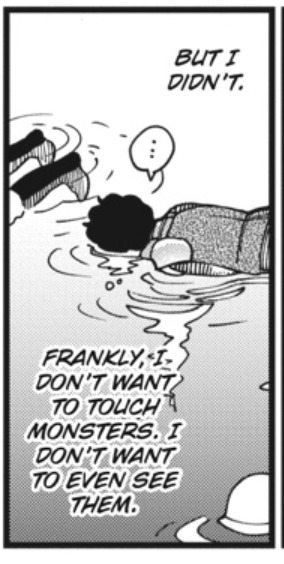
To acknowledge a kinship, a possibility of similarity between the things he loves (humans) and the things he hates (monsters) would be more than touching them - it would be putting them inside him. We know, quite explicitly, that this notion is triggering to Kabru. He literally has what seems to be a flashback when he's about to eat the harpy omelette.
So he abjects it, classifying the demi-human as fundamentally unlike him - an unknowable object, or an object that he refuses to know. Because in understanding it, he would interject the things he hates and fears into his self, which is already, always under threat by that hated and feared object.
Of course, again, Kabru isn't very good at enacting this refusal in practice. For one, when he chooses between his desires and ingesting the feared object, eating monsters... he eats monsters. Part of this is treating himself badly, the "ends justify the means" mentality. His goal is to destroy all monsters, so if he needs to become monster-like to do that, he will. But part of it is also the other motivation that he didn't even seem to know about until he said it: he wants to become Laios' friend, and to learn from him how a person can like monsters. He wants, at least in some part of him, to reconcile the feared and hated object into something he can understand.
For another:
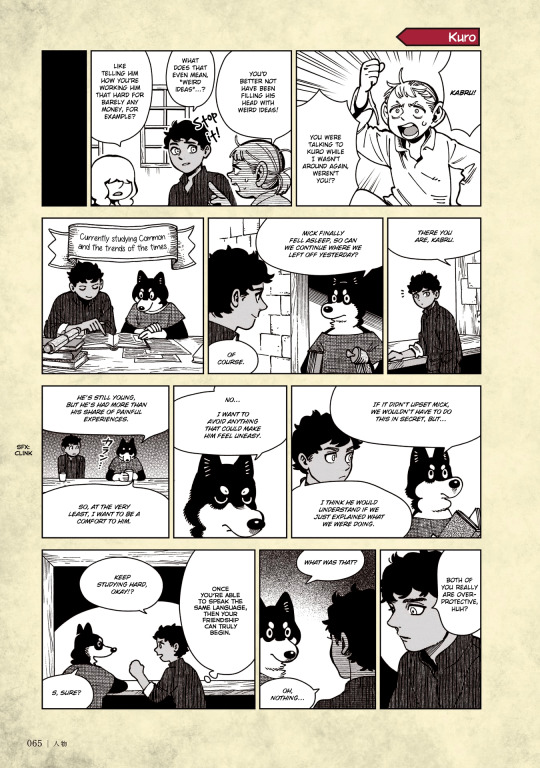
Kabru can speak the kobold language. In the first place, while this may have been common in Utaya, it also could have been something he chose to learn, an early expression of his interest in understanding and talking to all sorts of people. It isn't the kind of thing you learn if you believe that communication between yourself and the group that speak it is impossible, is it?
It's possible to harbour prejudices against a group while being kind to an individual, and given Kabru has those prejudices regardless of his reasons, that is what he is doing. But also, his treatment of Kuro doesn't reflect a sincerely held belief that he's an "unknowable object" at all. His approach is exactly the same as it is to any other person: an analysis of goal and motive, and an attempt to help if he's sympathetic and their goals align - going out of his way to give language and local knowledge lessons in secret. His conviction that Mickbell and Kuro will truly become friends when they can properly communicate is completely contradictory to any sense of demi-humans as fundamentally different, or impossible to reach mutual understanding with. To me, it seems like this self-protective shield against the corruptive force demi-humans as an idea present to his identity, this abjection, when Kabru is face-to-face with one, just simply can't hold up against his finely honed skill of intellectual empathy. Perhaps because he's autistic, it seems his "empathy" is less an emotional mirror response, and more a set of cognitive skills for analysis of others. That instinctual, emotional empathy might not trigger when presented with a member of an out-group, but if it’s possible for Kabru to turn his cognitive empathy off, we don’t see him do it.
This isn't to say that this prejudice doesn't affect his behaviour. For one, it could negatively impact his judgement of politics and policy, where individual people don't enter into it. For another, I'm not convinced he'd be willing to overlook Mickbell's exploitative relationship with Kuro if Kuro wasn't a kobold. As it is, since both of them are satisfied, he doesn't feel like he needs to intervene, regardless of the fact Mickbell isn't paying Kuro. But if Daya and Holm were in a relationship, and Holm took both Daya's and his own share from their ventures, but only compensated her in living expenses and kept the rest, do you think he'd tolerate it, for example? Even if she said it was OK?
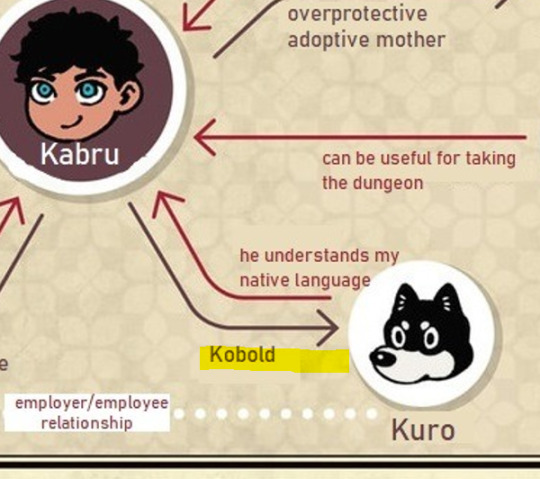
Conclusion

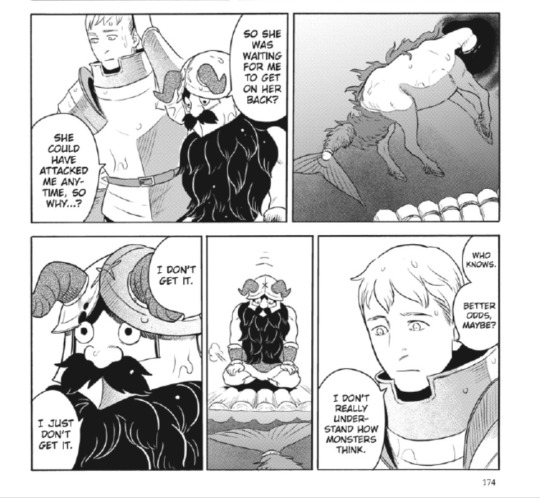
The kelpie chapter establishes that "people can never know what monsters are really thinking." That isn't just true of monsters, though.
True mutual understanding is impossible - between anyone. We can never truly understand another person's heart. This is touched on in, for example, the existence of shapeshifters and dopplegangers. Even a monster that seemed like a perfect copy of a person wouldn’t be that person, and wouldn’t be a satisfactory replacement.
We’re intended, I think, to understand the winged lion's repeated suggestions to just replace people who have been lost with copies as something uncanny, which demonstrates the way that the winged lion never manages to attain a complete understanding of humans. A version of a person who was created to fulfil your memories of them, to be the person who you wanted them to be, would be a terrible, miserable thing.
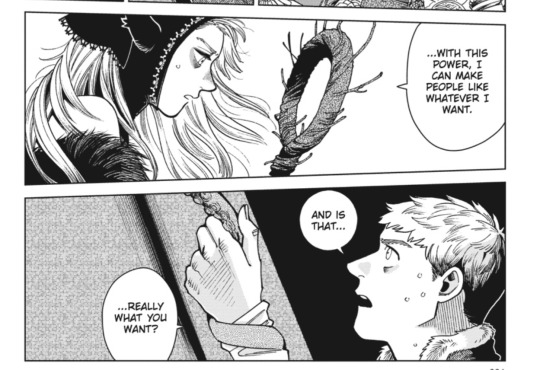
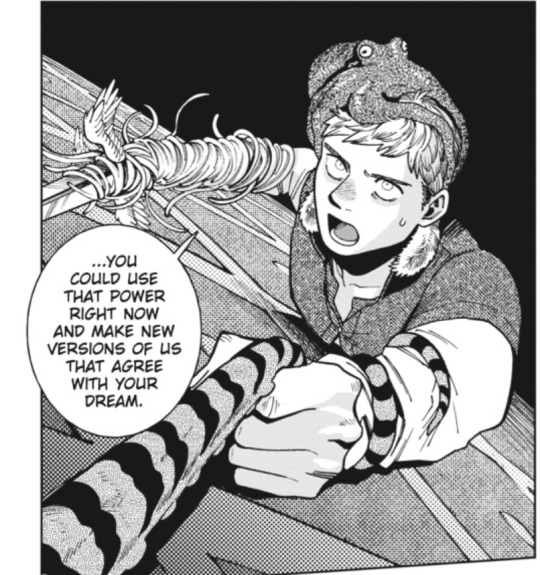

Disagreeing, coming into conflict, and misunderstanding each other, are essential parts of what it means to be living beings, as fundamental as the need to eat.
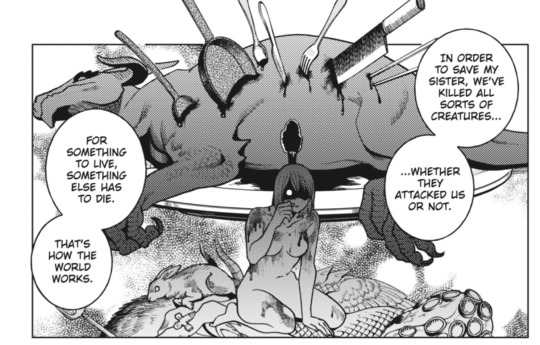
The only thing to do is not to take more than you need to eat to survive, and not impose your own desires onto others. To do your best to sincerely communicate your desires, even if they're embarrassing or vulnerable or strange, like Kabru eventually does with Laios; like Laios does, bit by bit, with the people around him; like Marcille does, Chilchuck does, Senshi does... to hope they will accept you, and do your best to understand them in return.
We can re-examine, in that context, Kabru's line about the elves' tendency to "explain nothing and take everything".
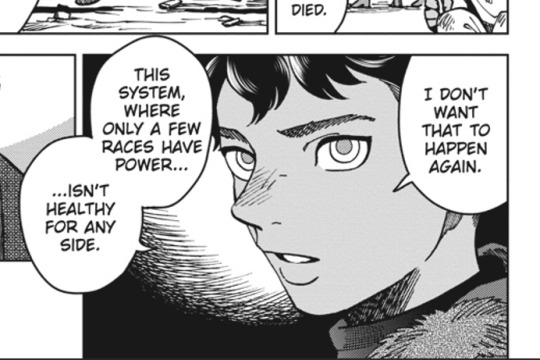
They have the power to impose their preferred "menu" onto less powerful groups. And in that context, mutual understanding being impossible just means that they won't give up their power because they're asked nicely. Kabru's goal is to seize the truth that they won't give to him, and to create a situation where they can't take everything. Because he's accurately surmised that nothing about the treatment of short-lived races will change so long as the power imbalance remains. Despite the way he mistakenly ascribes part of that to "long-lived vs short-lived" or "human vs demi-human", the actual gulfs in understanding he identifies are structural, are about power and about access to material resources and safety.
I think he could come to recognise this. Yaad is teaching him political science after all, and while a prince's lessons on political science won't exactly get at much that's radical or invested in the interests and perspectives of the marginalised (Capital is a critique of for a reason after all...) I believe in Kabru's ability to learn critically and get more from a lesson than it was intended to teach.
#og post#kabru of utaya#kabru dungeon meshi#laios touden#dungeon meshi meta#dungeon meshi#dunmeshi#dungeon meshi manga spoilers#dungeon meshi analysis#kuro dungeon meshi#the canaries#milsiril#continuing to develop my kabru theses.#literally sitting and thinking about kabru all day. rotating him.#he's in the microwave. to me.
2K notes
·
View notes